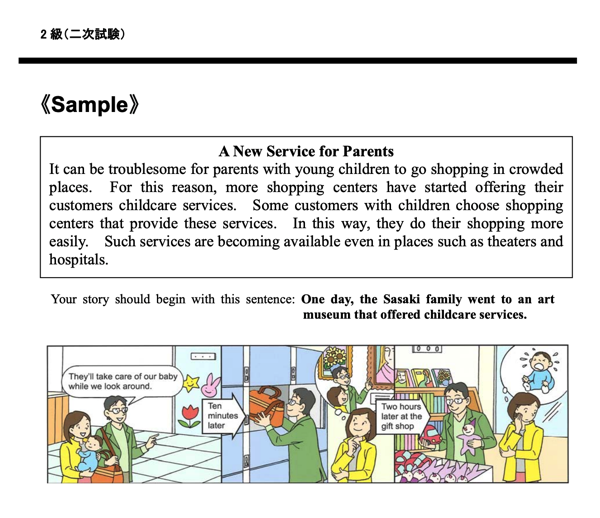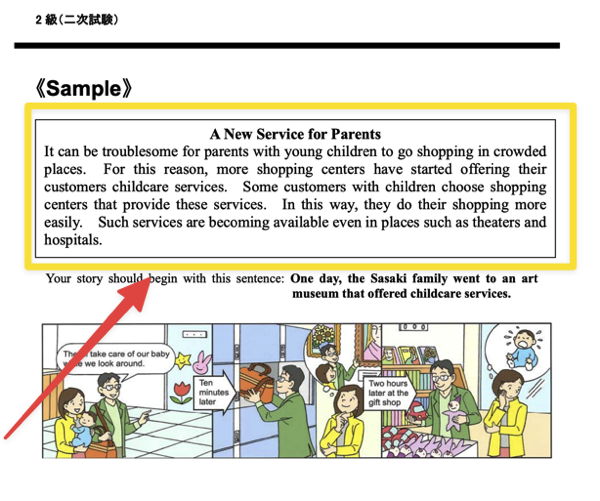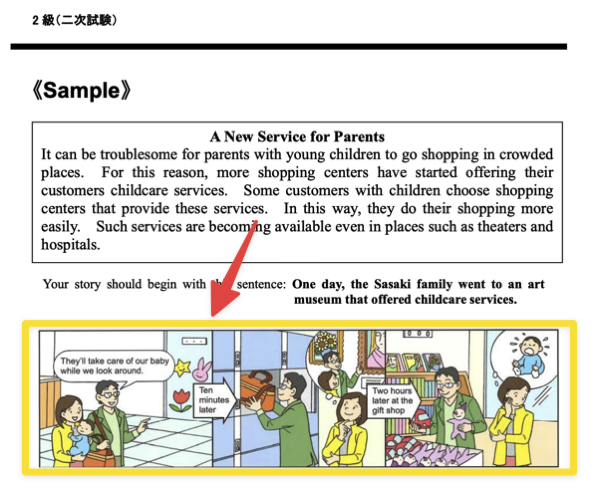【最新版】英検準1級要約予想問題
英検準1級要約問題対策!プロが教える3ステップ&高得点のコツ
ページ目次英検準1級の要約問題を完全攻略!英検準1級要約問題の概要を掴もう!英検準1級の要約問題は1文何文字程度が理想?そもそも要約とは? 情報を凝縮する達人になろう!抽象化で情報をギュッと凝縮!【準1級要約問題】攻略のカギは?追加:前の文に情報を付け加える【超重要】因果関係を掴むステップ③ 段落間
- …続きを読む
-
英検準1級の要約問題を完全攻略!
2024年から、英検準1級に要約問題が登場します!
これまで英作文1本だったライティングセクションが、リニューアルによって要約問題と英作文の2本立てになるのです。
「要約なんて書いたことない…」「一体どうやって対策すればいいの?」
そんな不安を抱えている方も多いのではないでしょうか?
ご安心ください!
この記事では、英検準1級の要約問題で高得点を取るための具体的な対策法を、豊富な例文と練習方法を交えながら、
[toc]
TOEIC990点、英検1級保持者、英語指導歴10年以上のプロが徹底解説します。この記事を読めば、要約問題の攻略法がわかり、自信を持って試験に臨めるようになりますよ。

ぜひ最後まで読んで、要約問題マスターを目指しましょう!
英検準1級要約問題の概要を掴もう!
まずは、新しく導入される要約問題の概要をしっかり理解しましょう。
英検準1級要約はどんな問題?
要約問題では、200語程度の英文が出題されます。
内容は社会問題や環境問題など、時事的なテーマが中心です。
この英文を読んで、重要なポイントを60〜70語の英語で要約していきます。
【英検準1級要約】試験時間と配点は?

試験時間はこれまで通り90分ですが、リーディング問題と語彙問題が削除され、その分ライティングに時間が割けるようになりました。
とはいえ、ライティング2題となっていますので、ライティングを書くのが苦手な人は、時間的に厳しいでしょう。
要約問題にかける時間の目安は15〜20分(安全圏は15分)です。
それ以上の時間をかけてしまうと、他の問題に支障が出てしまいます。
配点は英作文と同じく16点満点です。
内容、構成、語彙、文法の4つの観点から評価されます。
要約問題は、ライティングで大きなウェイトを占める重要なセクションです。
高得点を取るためには、対策が必須と言えるでしょう。
英検準1級の要約問題は1文何文字程度が理想?

英検準1級の要約問題では、1文あたりの語数は厳密に決まっているわけではありません。
しかし、簡潔で読みやすい要約文を作成するためには、1文あたり15~20語程度を目安にするのがおすすめです。
60~70語の要約文を作成する場合、1文が長すぎると、情報が詰め込みすぎになり、読みにくくなってしまいます。
反対に、1文が短すぎると、文章全体にまとまりがなくなり、論理展開がわかりにくくなる可能性があります。
15~20語程度を目安に、適切な句読点を使用し、文と文の繋がりをスムーズにする接続詞や副詞を効果的に活用することで、簡潔で論理的な要約文を作成することができます。
以下に、1文あたりの語数と要約文の例を示します。
【例1:1文あたりの語数が少ない場合】
The government made a new policy. It aimed to reduce traffic. It worked. (7語, 6語, 5語)
改善点: 文が短すぎて、内容が断片的になり、読みにくい。
【例2:1文あたりの語数が多い場合】
The government implemented a new policy to reduce traffic congestion, and it was very successful in achieving its goals of having fewer cars on the road and cleaner air, which made the city a much more pleasant place to live. (36語)
改善点: 文が長すぎて、情報量が多く、理解しにくい。
【例3:適切な語数で書かれた場合】
The government’s new policy, designed to reduce traffic congestion, proved to be highly effective and successful.
This resulted in fewer cars and, consequently, improved air quality and quality of life. (16 words, 15 words)
【ポイント】
1文あたりの語数を15~20語程度に収める。
接続詞 (and, but, so, becauseなど) や関係代名詞 (which, that, whoなど) を使って文と文を繋げる。
分詞構文や名詞構文などを活用して、文を短くまとめる。
これらのポイントを意識して、練習を重ねることで、適切な長さで、読みやすい要約文を作成できるようになるでしょう。
そもそも要約とは? 情報を凝縮する達人になろう!

新しい英検準1級に登場する「要約問題」。
一体どんな問題で、どんなスキルが必要なのでしょうか?
簡単に言うと、要約とは「文章の重要なポイントだけを抜き出して、簡潔にまとめること」です。
例えば、友達から「昨日のドラマ見た?めっちゃ面白かったんだよ!」と長々とあらすじを聞かされたとします。
でも、あなたは「えーっと、結局何が言いたいの?」と、話が長すぎて要点が掴めない…。そんな経験はありませんか?
そんな時、友達が「主人公が最後に大逆転して、悪役をやっつけたんだよ!」と細かい部分を抜かして、短くまとめてくれたら、「なるほど!面白そうじゃん!」と、すぐに理解できますよね。
これが要約です。
要約は、限られた時間の中で効率的に情報を得るために、
そして相手に情報をわかりやすく伝えるために、とても役立つスキルです。日常生活でも、要約スキルはあらゆる場面で活躍します。
- 新聞やニュース記事の内容を短くまとめて、家族や友人に伝える
- 会議やプレゼンテーションの内容を簡潔に記録する
- 論文やレポートの要点をまとめて、効率的に学習する
このように、要約スキルは、情報過多な現代社会を生き抜く上で必須のスキルと言えるでしょう。
英検準1級の要約問題では、英語で書かれた文章を英語で要約することが求められます。
これは一見難しそうに思えるかもしれませんが、ポイントを押さえれば、誰でもマスターすることができます。
ここでは、要約の基本的な考え方と具体的なテクニックを、豊富な例文と練習問題を交えながら解説していきます。
要約力を高めて、情報を効率的に処理し、相手に分かりやすく伝えられる達人を目指しましょう!
抽象化で情報をギュッと凝縮!

英検準1級の要約問題の練習として、、、
いきなり英語の文章を要約する前に、
要約をする上で非常に重要な“抽象化”することがどのようなことなのかを学んでいきましょう。抽象化とはどのようなことか?
抽象化とは、具体的な情報から共通の特徴や概念を抽出し、より上位の概念で表現することです。
例えば、「りんご、みかん、バナナ」という具体的な果物の名前を「果物」という抽象的な言葉で表現するのが抽象化です。
抽象化によって、情報をより簡潔にまとめることができ、要約文の作成がスムーズになります。
ここでは、まず日本語の文章を抽象化する練習問題を通して、抽象化のスキルを磨いていきましょう。
日本語要約練習問題
以下の文章を、抽象的な表現を使って短くまとめてみましょう。
- 昨日、近所のスーパーで、牛乳、卵、パン、チーズを買いました。
- 山田さんは、東京大学法学部を卒業後、弁護士として活躍し、その後、政治家になり、現在は国会議員として活動しています。
- 地球温暖化の影響で、海面が上昇し、島国では国土が水没する危険性があり、また、異常気象が頻発し、農作物の収穫量が減少し、食糧不足が懸念されています。
- 昨日、スーパーで食料品を買いました。
- 山田さんは、法曹界を経て政界に進出し、現在は国会議員として活躍しています。
- 地球温暖化は、環境問題や食糧問題など、様々な深刻な問題を引き起こしています。
解説
- 「牛乳、卵、パン、チーズ」という具体的な商品名を「食料品」という抽象的な言葉に置き換えました。
- 「東京大学法学部」「弁護士」「政治家」「国会議員」という具体的な職業や肩書きを「法曹界」「政界」という抽象的な言葉で表現しました。
- 「海面上昇」「国土水没」「異常気象」「農作物収穫量減少」「食糧不足」という具体的な事象を「環境問題」「食糧問題」という抽象的な概念にまとめました。
[/su_spoiler]
抽象化は、要約問題だけでなく、様々な場面で役立つスキルです。
日頃から情報を整理することを意識し、抽象的な思考を鍛えることで、要約力だけでなく、思考力や表現力も向上させることができます。
もう少し抽象度を上げた解答例
[su_spoiler title="クリックして解答を表示" icon="plus-square-2"]- 昨日、買い物をしました。
- 山田さんは、専門性を活かしてキャリアを築いています。
- 地球温暖化は、地球規模で深刻な影響を及ぼしています。
解説
- 「スーパー」や「食料品」といった具体的な情報を省き、「買い物」というより抽象的な行動で表現しました。
- 具体的な職業や経歴を省き、「専門性を活かしたキャリア」という抽象的な表現でまとめました。
- 具体的な問題点を省き、「地球規模で深刻な影響」という、より包括的な表現で要約しました。
[/su_spoiler]
抽象化はより広い範囲を包含する言葉を選ぶことで、文章を短くしつつ、本質的な情報を伝えることができます。
よくありがちな間違いとして、具体、抽象の二部法で考えてしまうことです。
どちらも相対的な概念なので、対象となる文章同士を比べて抽象か、具体なのかを決めるようにしましょう。
要約に唯一の正解はないのです!!
状況や目的に応じて、どの程度の抽象度で情報をまとめるべきかが変わってきます。
例えば、上の例で「果物」よりもさらに抽象化すると「食べ物」という表現も可能です。
「食べ物」は「果物」よりも広い概念を包含しているので、より抽象度が高いと言えます。
どのレベルの抽象度が適切かは、要約する文章のテーマや目的、そして字数制限などを考慮して判断する必要があります。
ここでは、日本語の文章を抽象化する練習問題を通して、抽象化のスキルと適切な抽象度を見極める力を磨いていきましょう。
抽象化をする際のコツ
- 具体的な名詞をグループ化する: 共通の特徴を持つ名詞を、より上位の概念でまとめる
- 動作や状態を一般化する: 特定の行動や状況を、より一般的な言葉で表現する
- 情報をカテゴリー化する: 複数の情報を、共通のテーマやカテゴリーに分類する
- 状況や目的に応じて、適切な抽象度を選ぶ: 要約する文章のテーマや目的、そして字数制限などを考慮して、抽象度を調整する
日頃から情報を整理することを意識し、抽象的な思考を鍛えることで、英検準1級の要約力だけでなく、読解力はもちろんのこと、思考力や表現力も向上させることができます。
【準1級要約問題】攻略のカギは?

要約問題を効率的に解くために、以下の3ステップを意識しましょう。
- ステップ1:読解
- ステップ2:捨象
- ステップ3:変換
【ステップ1】 読解 論理構成を把握する

要約問題で高得点を取るには、英文の論理構成を正確に理解することが最も重要です。
建物を建てる前に設計図が必要なように、要約文を作る前にも文章全体の設計図=論理構成を理解することが不可欠です。
論理構成とは、筆者がどのような流れで主張を展開しているのか、という文章の骨組みのこと。
これを把握することで、どの情報が重要で、どの情報が補足的なのかが明確になります。
例えるなら、文章全体を俯瞰する地図を手に入れるようなイメージです。
下記3点に注意して、文章を読んでいきましょう。
- トピックセンテンスを探す
- ディスコースマーカーに注目する
- 段落間の関係性を掴む
具体的に一つずつ見ていきましょう。
① トピックセンテンスを探す
要約問題を攻略するには、まず各段落が何を伝えたいのかを理解することが重要です。
そのために、各段落のトピックセンテンスを見つけ出す練習をしましょう。
トピックセンテンスとは、その段落の主題を端的に示した文のこと。いわば、各段落のリーダーのような存在です。
多くの場合、段落の最初の文がトピックセンテンスになりますが、必ずしもそうとは限りません。
注意深く 段落全体を読み、筆者が最も伝えたいことを見抜くことが重要です。
それでは、具体的に文章を読んで見ていきましょう。
【例文】
Recycling is one way to protect the environment, but it is not a perfect solution. Many recycled materials are downcycled, meaning they are turned into lower-quality products. Furthermore, the recycling process itself can be energy-intensive and produce pollution. Recently, reducing waste has been receiving a lot of attention as a more sustainable approach. By reducing consumption and reusing items, we can minimize the amount of waste that needs to be recycled or disposed of. This approach is gaining popularity as people become more aware of the environmental impact of their choices.
最初の数文はリサイクルの限界について説明しています。
しかし、続く文章では、Recentlyで話が転換をして、より持続可能なアプローチとして「ゴミ削減」が注目されていることがわかります。
そして、消費を減らし、物を再利用することで、リサイクルや廃棄されるゴミの量を最小限に抑えることができると述べています。
つまり、この段落のトピックセンテンスは「reducing waste has been receiving a lot of attention」です。
② ディスコースマーカーに注目する

次に、ディスコースマーカー(論理マーカーとも呼ばれます)に注目しましょう。
ディスコースマーカーなんて聞いたことありません!

ディスコースマーカーとは、文と文の関係性を示す言葉のこと。
いわば、文章の流れを読み解くためのヒントであり、筆者の思考を辿る道しるべです。
これを理解すれば、筆者がどのような論理で文章を組み立てているのかを把握することができます。
逆にいうと、ディスコースマーカーがわからないと文章を理解することは不可能です。

いわば名探偵が事件の真相を解明する手がかりのようなもの。
それぞれのディスコースマーカーが持つ意味合いを理解し、文と文の繋がりを見抜くことで、英文の論理構成をより深く理解することができます。
代表的なディスコースマーカーを4つの種類に分けて、例文を交えながら解説していきます。
- 逆説
- 例示
- 追加
- 因果関係
逆説:前の文と反対の内容を述べる
- However,
- Although 主語+動詞, 主語+動詞
- 主語+動詞, but 主語+動詞
【例】
Smartphones offer many advantages, such as easy access to information and convenient communication. However, excessive smartphone use can have negative impacts on mental and physical health.
【解説】
最初の文でスマートフォンの利点を述べた後、Howeverで逆説を導入し、後半では「使いすぎると健康に悪影響がある」という反対の内容を述べています。
【要約のポイント】
逆説のディスコースマーカーの後には、筆者が本当に伝えたい重要な情報が置かれることが多いです。要約する際は、However以降の内容を重視しましょう。
例示:前の文の具体例を挙げる
- For example,
- 主語+動詞, including 名詞
- 主語+動詞, such as 名詞
【例】
Renewable energy sources are becoming increasingly important in combating climate change. For example, solar and wind power are now more affordable and accessible than ever before.
【解説】
最初の文で再生可能エネルギーの重要性を述べた後、For exampleで具体例を導入し、後半では太陽光発電や風力発電を例に挙げて説明しています。
【要約のポイント】
例示はあくまで補足情報なので、要約する際は省略しても問題ありません。
重要なのは、例示の前にある主張です。
英検2級では入れることがありますが、英検準1級では原則入れないと考えてください。
追加:前の文に情報を付け加える
- Additionally,
- S also V (←忘れがちなので重要)
- Some 文章 others 文章
【例】
Regular exercise has numerous health benefits. Additionally, it can improve mood, reduce stress, and boost cognitive function.
【解説】
最初の文で運動の健康効果を述べた後、Additionallyで情報を追加し、後半では気分改善、ストレス軽減、認知機能向上といった具体的な効果を挙げています。
【要約のポイント】
追加情報は主張を補強する役割を持つため、要約する際に重要な情報となります。
【超重要】因果関係を掴む

原因 (S’V’, SV) 原因 (句) 結果 (SV) Because Due to 名詞 Therefore, Because of 名詞 Thus, Consequently, As a result, 文章の内容を理解する上で非常に重要な概念です。
ディスコースマーカーだけでなく下記3パターンで因果関係がよく使われるので注意してください。
- ディスコースマーカー
- 名詞構文
- 分詞構文
【例1:ディスコースマーカーで明示的に因果関係を表す場合】
The demand for electric cars is increasing. Consequently, car manufacturers are investing heavily in the development of new electric vehicle models.
【解説】
最初の文で電気自動車の需要増加を述べ、Consequentlyで結果を示し、後半では自動車メーカーが電気自動車モデルの開発に投資していることを述べています。
【例2:名詞構文で因果関係を表す場合】
The popularity of online shopping has led to a decline in traditional retail stores.
【解説】
この文では、「オンラインショッピングの人気が高まったこと」が原因で「従来の小売店の衰退」という結果が生まれたことを、名詞構文 “The popularity of online shopping” を主語にすることで表現しています。
【例3:文末の分詞構文で因果関係を表す場合】
Many people are choosing to live in urban areas, leading to increased population density in cities.
【解説】
この文では、「多くの人が都市部に住むことを選択していること」が原因で「都市部の人口密度が高まっている」という結果が生まれたことを、分詞構文 “leading to increased population density in cities” を使って表現しています。
【要約のポイント】
因果関係は、文章の論理展開を理解する上で非常に重要です。
特に、名詞構文や分詞構文で因果関係が表現されている場合は見落としがちなので、注意深く読み取るようにしましょう。
ディスコースマーカーは、筆者の思考を理解するための重要な手がかりです。それぞれのマーカーが持つ意味合いを理解し、文と文の繋がりを見抜くことで、英文の論理構成をより深く理解し、効果的な要約文を作成することができます。

ステップ③ 段落間の関係性を掴む
各段落のトピックセンテンスとディスコースマーカーを手がかりに、段落間の関係性を掴むことが重要です。
これは、森の木々を見るのではなく、森全体を俯瞰するようなイメージ。
全体像を把握することで、筆者の主張の核心が見えてきます。
英検準1級の要約問題では、多くの場合、3段落構成が採用されます。
各段落はそれぞれ特定の役割を担っており、それらが組み合わさることで、筆者の主張を効果的に伝える論理構造が構築されています。
英検準1級の要約問題では、多くの場合、3段落構成で以下のようなパターンが見られます。
- 第1段落:導入(社会問題や現状の説明)
- 第2段落:賛成意見(メリットや利点)
- 第3段落:反対意見(デメリットや懸念点)
【例】
第1段落:
The rise of social media has had a profound impact on society. It has changed the way we communicate, consume information, and interact with the world around us.
第2段落:
Proponents of social media argue that it has democratized information and made it easier for people to connect with each other. They point to the role of social media in facilitating social movements and raising awareness of important issues.
第3段落:
However, critics argue that social media can be addictive and contribute to a decline in mental health. They also express concerns about the spread of misinformation and the erosion of privacy.
この例では、第1段落で「ソーシャルメディアの影響」というテーマが提示され、第2段落で「賛成派の意見」、第3段落で「反対派の意見」が述べられています。
その他の代表的なパラグラフの論理展開例
具体的な英文例を挙げながら解説します。
1. 問題提起 → 解決策 → 効果・影響
第1段落(問題提起):
The world’s population is growing rapidly, and this is putting a strain on our ability to produce enough food for everyone. Food security is a major concern, as climate change, water scarcity, and land degradation threaten agricultural productivity.
第2段落(解決策):
One potential solution to this problem is vertical farming. Vertical farms are multi-story buildings where crops are grown indoors under controlled conditions. This method uses less water and land than traditional agriculture, and it can be implemented in urban areas, closer to consumers.
第3段落(効果・影響):
Vertical farming has the potential to revolutionize food production, making it more sustainable and efficient. By reducing transportation costs and food waste, vertical farms can also help to lower the environmental impact of agriculture. However, there are challenges to overcome, such as the high energy consumption of indoor growing systems.
【解説】
この文章は、世界の人口増加に伴う食糧問題を提起し、その解決策として垂直農法を紹介しています。
第1段落では食糧安全保障が重要な課題であることを示し、第2段落では垂直農法の特徴と利点を説明しています。
そして第3段落では、垂直農法が食糧生産に革命をもたらす可能性がある一方で、克服すべき課題も存在することを指摘しています。
2. 現状の説明 → メリット → デメリット
第1段落(現状の説明):
The COVID-19 pandemic has accelerated the adoption of remote work. With advances in technology, many employees are now able to perform their jobs effectively from home. This shift has led to a significant change in the traditional workplace.
第2段落(メリット):
Remote work offers several benefits for both employees and employers. Employees can enjoy greater flexibility and work-life balance, while employers can reduce office space costs and access a wider pool of talent.
第3段落(デメリット):
However, remote work also presents some challenges. Maintaining communication and collaboration among team members can be difficult, and some employees may struggle with isolation and loneliness.
【解説】
この文章は、パンデミックをきっかけに普及したリモートワークについて、そのメリットとデメリットを論じています。
第1段落ではリモートワークの普及という現状を説明し、第2段落では従業員と雇用主双方にとってのメリットを挙げています。
そして第3段落では、コミュニケーションや孤独感といったリモートワークに伴う課題を指摘しています。
3. 現象の提示 → 原因 → 結果
第1段落(現象の提示):
Surveys show that young people are reading less than ever before. This trend is concerning, as reading has numerous benefits for cognitive development, language acquisition, and emotional intelligence.
第2段落(原因):
Several factors contribute to this decline in reading. The rise of social media and streaming services has created more competition for young people’s attention. Additionally, many young people find traditional books to be boring or irrelevant to their lives.
第3段落(結果):
This decline in reading could have serious consequences. It could lead to a decline in literacy rates, critical thinking skills, and empathy. Furthermore, it could make it more difficult for young people to succeed in school and in their future careers.
【解説】
この文章は、若者の読書離れという現象を取り上げ、その原因と結果について分析しています。
第1段落では読書離れという現状を提示し、その問題点を指摘しています。
第2段落ではソーシャルメディアの普及や従来の書籍への興味関心の低下など、読書離れの原因を分析しています。
そして第3段落では、読書離れがもたらす深刻な影響について警鐘を鳴らしています。
4. 主張の提示 → 根拠1 → 根拠2
【例:音楽教育の重要性】
第1段落(主張の提示):
Music education is essential for the holistic development of children. It not only fosters creativity and self-expression but also enhances cognitive skills and promotes social and emotional growth.
第2段落(根拠1):
Studies have shown that learning music can improve children’s memory, attention, and language skills. Playing a musical instrument requires coordination and discipline, which can translate to other areas of life.
第3段落(根拠2):
Furthermore, music education provides opportunities for children to collaborate and connect with others. Participating in a choir or orchestra fosters teamwork and communication skills.
【解説】
この文章は、音楽教育の重要性を主張し、その根拠を2つの段落で提示しています。
第1段落では、音楽教育が子供たちの全体的な発達に不可欠であると主張しています。
第2段落では、音楽学習が子供の記憶力、注意力、言語能力を向上させるという研究結果を根拠として示しています。
第3段落では、音楽教育が子供たちに協調性やコミュニケーション能力を育む機会を提供するという根拠を述べています。
これらの例以外にも、様々な論理展開があります。
重要なのは、各段落の役割を理解し、全体としてどのような論理構造で筆者の主張が展開されているのかを把握することです。
この全体像を掴むことで、要約すべきポイントが明確になり、効果的な要約文を作成することができます。
【ステップ2】捨象 一般化・抽象化する

先ほど行った日本語での抽象化を今度は英語で行なっていきましょう。
ステップ1で英文の論理構成を把握したら、次は情報を一般化・抽象化していきます。
これは、具体的な情報から重要なポイントを抽出し、より少ない言葉で表現するテクニック。
例えるなら、旅行の荷物をコンパクトにまとめるようなイメージです。
要約問題では、制限字数内に収めるために必須のスキルと言えるでしょう。
具体的な情報は抽象的な言葉に置き換える
文章中に登場する具体的な名詞(人物名、地名、組織名、商品名など)は、より抽象的な言葉に置き換えましょう。
【問題例】
In 2023, a team of scientists at Harvard University developed a new type of battery that can store twice as much energy as conventional batteries. The new battery is made from a combination of lithium and graphene, and it is expected to revolutionize the electric vehicle industry.
【解説】
この文には、「2023年」「ハーバード大学の科学者チーム」「リチウムとグラフェン」「電気自動車産業」といった具体的な名詞が登場します。
これらの名詞を抽象的な言葉に置き換えてみましょう。
- 2023年 → 近年 recent years
- ハーバード大学の科学者チーム → 科学者たち researchers
- リチウムとグラフェン → 新素材 advanced materials
- 電気自動車産業 → 産業界 the industry
【抽象化後の文章(日本語)】
近年、科学者たちは従来のバッテリーの2倍のエネルギーを蓄えられる新しいタイプのバッテリーを開発した。この新素材で作られたバッテリーは、産業界に革命を起こすと期待されている。
【抽象化後の文章(英語)】
In recent years, researchers have developed a new type of battery that can store twice as much energy as traditional batteries. This new battery, made from advanced materials, is expected to transform the industry.
このように、具体的な名詞を抽象的な言葉に置き換えることで、情報の焦点がより明確になります。
具体的な数値や統計データを「多数」「少数」などの言葉で表現する
文章中の具体的な数値や統計データは、「多数」「少数」「ほとんど」「わずか」などの言葉で表現することで、情報を凝縮できます。
【問題例】
A recent study found that 85% of American adults own a smartphone, while only 35% own a tablet device.
【解説】
この文には、「85%」と「35%」という具体的な数値が登場します。これらの数値を抽象的な言葉で表現してみましょう。
- 85% → 大多数 majority
- 35% → 少数 minority
【抽象化後の文章】
最近の調査によると、米国の成人の大多数がスマートフォンを所有しているのに対し、タブレット端末を所有しているのは少数にとどまることがわかった。
In a recent survey, the majority of employees expressed satisfaction with their job, while a minority were dissatisfied, and a portion remained neutral.
このように、具体的な数値を言葉で表現することで、情報を簡潔に伝えることができます。
練習問題
以下の文を、具体的な数値を言葉で表現してみましょう。
- In a survey of 500 college students, 75% reported feeling stressed about their academic workload.
- The company’s revenue increased by 20% last quarter, while its profits rose by only 5%.
【解答例】
1. A survey of college students revealed that a significant majority reported feeling stressed about their academic workload.
2. The company’s revenue saw a substantial increase last quarter, while its profits grew only marginally.
以上の2つのテクニックを組み合わせることで、具体的な情報を抽象化し、より少ない言葉で要点を表現することができます。要約問題に取り組む際は、これらのテクニックを活用して、制限字数内で的確に情報を伝えることを心がけましょう。
【ステップ3】変換 ~ 言い換えテクニックで要約力を高めよう!

ステップ2で情報を一般化・抽象化したら、いよいよ言い換えを行い、要約文を作成していきます。
このステップでは、情報を整理して得た「地図」と「コンパクトな荷物」を使って、自分だけのオリジナルの要約文を作り上げていくイメージです。
言い換えには、以下の2つの目的があります。
- 同じ表現の繰り返しを避ける
- より洗練された表現にする
言い換えテクニックをマスターすることで、採点官に「この受験者は語彙力があり、表現力も豊かだな」と好印象を与えることができます。
同意語を使う ~ 語彙力をアピール!
同じ単語を何度も使うのではなく、同意語を積極的に使うことで、語彙力をアピールしましょう。
【例】
Many students experience anxiety before taking an important exam.
↓
Numerous students feel anxious prior to taking a crucial exam.
このように、“many” を “numerous”、“important” を “crucial” という同意語に言い換えることで、より洗練された印象になります。
英検準1級レベルの同意語をいくつか紹介しますので、ぜひ参考にしてみてください。
よく使う単語 同意語 important crucial, significant, essential, vital problem issue, challenge, difficulty, obstacle solution answer, resolution, remedy, approach improve enhance, boost, upgrade, refine reduce decrease, diminish, lessen, alleviate increase rise, grow, surge, escalate support back, advocate, promote, endorse oppose resist, object to, challenge, criticize argue claim, assert, contend, maintain believe think, consider, hold, deem 練習問題1
次の文の太字部分を、上記の表を参考に同意語に言い換えてみましょう。
- Many experts believe that climate change is a serious problem.
- The government is implementing a new policy to reduce traffic congestion.
- Exercise can improve both physical and mental health.
【解答例】
1. Numerous experts consider that climate change is a serious issue.
2. The government is implementing a new policy to alleviate traffic congestion.
3. Exercise can enhance both physical and mental health.
[/su_spoiler]
文を句で表現する ~ 短くスマートな表現をマスターしよう!
「文を句で表現する」とは、主語と動詞を含む文を、名詞句や形容詞句などに言い換えるテクニックです。
文章をより短く、スマートで洗練された表現にすることができます。
これは、制限字数のある要約問題において非常に有効なテクニックと言えるでしょう。
具体的な方法を、文法項目を交えながら解説していきます。
接続詞を前置詞句に置き換えて文を短縮しよう!
要約問題では、限られた字数の中で情報を正確に伝える必要があり、簡潔な表現が求められます。
そこで役立つのが、接続詞を前置詞句に置き換えるテクニックです。
接続詞で始まる副詞節を、前置詞句にすることで、文を短くすることができます。
特に因果関係を表す接続詞 “because” は、前置詞 “due to” や “because of” を使った句に置き換えることで、より簡潔で洗練された表現にすることができます。
実例で確認
【例文】
The game was canceled because the weather was bad.
↓
The game was canceled due to the bad weather.
The game was canceled because of the bad weather.
このように、接続詞 “because” を前置詞句 “due to” や “because of” に置き換えることで、より簡潔で自然な表現にすることができます。
ポイント
“due to” と “because of” はどちらも「~のために」という意味ですが、”due to” の方がよりフォーマルな印象を与えます。
前置詞句は、文頭に置かれることが多いですが、主節の後に置くことも可能です。
“because” を前置詞句に置き換える際には、動詞を名詞化する必要がある場合があります。
練習問題
以下の文の “because” を前置詞句 “due to” または “because of” に置き換え、文を書き換えてみましょう。
- Because the traffic was heavy, I was late for the meeting.
- Many people are choosing to work from home because the cost of commuting has increased.
- The concert was canceled because the lead singer got sick.
【解答例】
1. Due to the heavy traffic, I was late for the meeting. / Because of the heavy traffic, I was late for the meeting.
2. Many people are choosing to work from home due to the increased cost of commuting. / Many people are choosing to work from home because of the increased cost of commuting.
3. The concert was canceled due to the lead singer’s illness. / The concert was canceled because of the lead singer’s illness.
接続詞を前置詞句に置き換えるテクニックをマスターすることで、要約問題でより効果的に情報を伝えることができるようになります。
積極的に練習に取り組んで、簡潔で洗練された英文作成スキルを磨いていきましょう!
名詞構文を効果的に活用する
“increased” を “increase” に名詞化します。
【例文】
Due to the increase in the price of gasoline, many people started using public transportation.

名詞構文を効果的に活用することで、よりアカデミックで洗練された表現にすることが可能です。名詞構文とは、動詞を名詞化して主語にする構文のことです。
【例】
The government decided to implement a new policy.
↓
The government’s decision to implement a new policy was met with mixed reactions.
このように、“decide”を“decision”という名詞化することで、よりフォーマルで客観的な印象になります。
名詞構文は、アカデミックな文章で頻繁に使われる表現なので、要約問題で効果的に活用することで、高評価に繋がります。
練習問題2
以下の文を、句を使って短くし、さらに名詞構文を使って書き換えてみましょう。
- The use of smartphones has increased rapidly, and this is causing concern among educators.
- The government invested heavily in renewable energy, and this resulted in a significant reduction in carbon emissions.
- Scientists conducted a thorough investigation, which led to a new discovery in the field of medicine.
- The number of people working from home has risen dramatically, and this is changing the way companies operate.
【解答例】
1. The rapid increase in smartphone use is causing concern among educators. → The rapid increase in smartphone use has led to concern among educators.
2. Due to heavy government investment in renewable energy, there was a significant reduction in carbon emissions. → Heavy government investment in renewable energy has resulted in a significant reduction in carbon emissions.
3. A thorough investigation by scientists led to a new discovery in the field of medicine.
4. The dramatic rise in the number of people working from home is bringing about changes in how companies operate.
[/su_spoiler]
名詞構文についてはこちらの記事で詳しく説明しています。
[nlink url="https://hiroacademia.jpn.com/blog/sankosyo/eigo/meishikobun-2/"]また、名詞構文の練習には下記の教材がおすすめです。
『ここで差がつく!英文ライティングの技術』、『発信型英語スーパーレベルライティング』
[itemlink post_id="25074"] [itemlink post_id="25075"]パラフレーズのコツ ~ 柔軟な発想で表現の幅を広げよう!
パラフレーズは、単に単語を置き換えるだけでなく、文全体の構造を変えたり、異なる視点から表現したりするなど、柔軟な発想が求められます。
いくつか具体的な方法を紹介しましょう。
受動態と能動態の変換
【例】
The new law was passed by the government. (受動態)
↓
The government passed the new law. (能動態)
受動態を能動態に変えることで、文章が短くなり、より直接的な表現になります。
文型を変える
【例】
The company’s profits increased significantly due to the new marketing strategy. (SVO)
↓
The new marketing strategy brought about a significant increase in the company’s profits. (SVOC)
文型を変えることで、同じ内容を異なる視点から表現することができます。
類義語だけでなく、反意語も活用する
【例】
The team’s performance was poor.
↓
The team failed to perform well.
反意語を使うことで、表現に変化を与え、より洗練された印象にすることができます。
練習問題3
次の文を、できるだけ多くの方法でパラフレーズしてみましょう。
[su_spoiler title="解答を表示" icon="plus-square-2"]The increasing popularity of electric vehicles is contributing to a decrease in air pollution.
【解答例】
Air pollution is decreased due to the rising popularity of electric vehicles. (受動態)
The more popular electric vehicles become, the less air pollution there is. (比較級)
Electric vehicles are becoming increasingly popular, which is leading to a reduction in air pollution. (関係代名詞)
The growing demand for electric vehicles is helping to improve air quality. (反意語)
[/su_spoiler]
パラフレーズのコツは、色々な表現方法を試して、表現の幅を広げていくことです。
積極的に練習に取り組むことで、要約問題に必要な柔軟な表現力を身につけることができます。
英検準1級要約問題の練習方法を紹介!
要約問題は、実際に練習を重ねることが重要です。
以下のステップで練習してみましょう。
【ステップ1】 英文記事を読む
まずは、英字新聞や雑誌の記事など、200語程度の英文を読み、内容を理解する練習をしましょう。
おすすめは、The Japan TimesやBBC Newsなどのオンラインニュースサイトです。
まずは興味のある分野の記事を選ぶことで、モチベーションを維持しやすくなります。
【ステップ2】 各段落を要約する
英文全体を読んだら、各段落の要旨を日本語でメモしましょう。
この時、ステップ1で学んだ論理構成の把握を意識することが重要です。
- トピックセンテンスは何か?
- ディスコースマーカーはどのように使われているか?
- 段落間の関係性は?
これらの点を考慮しながら、各段落の核となる情報を抽出していきます。
【ステップ3】 要約文を作成する
日本語でメモした内容を基に、60~70語の英文要約文を作成しましょう。
この時、ステップ2で学んだ一般化・抽象化と言い換えのテクニックを活用することが重要です。
また、文法やスペルのミスがないか、論理的に矛盾がないかなど、見直すことも忘れずに行いましょう。
【ステップ4】 模範解答と比較する
作成した要約文と模範解答を比較し、改善点を見つけましょう。
内容、構成、語彙、文法の4つの観点から、自分の要約文を分析してみましょう。添削を受けるよりもまずは自分でチェックできるレベルを上げていくのが重要です。

- 重要な情報は全て網羅されているか?
- 論理展開は明確でわかりやすいか?
- 適切な語彙が使われているか?
- 文法やスペルのミスはないか?
こちらの記事で予想問題を作成したので、ここまでに学んだ考え方を使って問題を解いてみてください。
[nlink url="https://hiroacademia.jpn.com/blog/kentei/eigokentei/grade-pre1/eiken-pre1-yoyakuyosou/"]まとめ|英検準1級要約問題を制覇しよう!
この記事では、英検準1級の要約問題の概要と対策法を詳しく解説しました。
要約問題は、英文の論理構成を把握し、情報を一般化・抽象化し、適切な表現で言い換えることが重要です。
これらのスキルは、一朝一夕に身につくものではありません。日頃から英文に触れ、積極的に要約する練習を積み重ねることで、着実に実力アップを目指しましょう。

自信を持って試験に臨めるよう、しっかりと準備を進めていきましょう!
[eiken-counseling]
【英検2級】スピーキング対策!プロが指導する合格する勉強法|英検指導塾が監修
ページ目次【英検2級】スピーキング対策!プロが指導する合格する勉強法【英検2級スピーキング】試験の概要【英検2級スピーキング】試験の流れ【英検2級スピーキング】問題別対策【英検2級スピーキング】直前対策諦めずにとにかく最後まで話す対策でお困りの場合はヒロアカへ 【英検2級】スピーキング対策!プロが指
- …続きを読む
-
【英検2級】スピーキング対策!プロが指導する合格する勉強法
英検2級のスピーキングは対策さえしっかりできれば合格するのは難しくありません、
[toc]
本ブログ記事ではどのように対策をしたら良いのかを0からプロ目線でお伝えしていきます。【英検2級スピーキング】試験の概要
スピーキング試験の位置づけと特徴
英検2級の試験は、一次試験と二次試験の2つから構成されています。
一次試験は筆記試験で、
読解力、文法力、リスニング、ライティング能力を確認する試験です。二次試験は面接形式で行われるスピーキング試験です。このスピーキング試験では、実際に英語を話す能力が試されます。
面接は個人面接で、面接官は1人です。面接時間は約7分間で、この間に音読や質疑応答など、決まった形式の出題が行われます。
つまり、英検2級の二次試験は、筆記試験では測れない英語のスピーキング能力を評価する試験なのです。
英語を話す力が問われる重要な位置付けにある試験といえます。出題内容と配点
英検2級2次試験の出題内容と配点
形式 配点 目標点 音読(パッセージの音読) 5 3 No.1(パッセージの質問) 5 3 No.2(3コマイラストの説明) 10 6 No.3(Q&A) 5 3 No.4(Q&A) 5 3 アティテュード 3 2 合計 33 20 英検2級のスピーキング試験では、発音、語彙力、文法、論理的思考力などの言語能力が評価されます。
単語の発音が正確で、文法を正しく用いることはもちろん、自分の意見を論理的に説明できるかどうかも重要視されます。
また、答えに必要な情報量を適切に提供できているかどうかも評価の対象となります。情報が不足していたり、答えがぼんやりしていると減点の要因となります。加えて、コミュニケーション態度も評価されます。
面接官の目を見て答える、相づちをうつ、質問を適切に繰り返すなど、円滑なコミュニケーションが取れているかがチェックされます。
これらのコミュニケーション態度は「アティチュード」と呼ばれ、採点の対象となっています。さらに、アイコンタクト、姿勢、反応の適切さなど、非言語的な要素も評価対象となります。
相手の反応に応じて適切に反応できるかどうかがチェックされるのです。このように、英検2級のスピーキング試験は、言語能力だけでなくコミュニケーション能力全般を多角的に評価するものといえます。
言語面と非言語面の両方の能力が問われる難易度の高い試験だといえます。英検2級2次試験の合格ライン
英検2級のスピーキング試験の配点は33点満点で、合格ラインは19点以上です。
つまり、33点の6割以上を取れば合格となります。過去の合格率は約8割程度です。
一次試験を突破できた方の英語力は十分あると考えられるので、二次試験も合格できる可能性は高いといえます。
一次試験に合格した方のほとんどは、十分な対策をすれば二次試験も突破できる実力があると言えます。
【英検2級スピーキング】試験の流れ
まずは、2級スピーキングの全体的な試験の流れを見ていきましょう。
入室から退室までの詳細な流れ
注意!
S-CBTでの受験の場合は、パソコンに向かって話すだけで問題カードの受け取り等ありません。英検2級のスピーキング試験は、入室から退室まで以下の流れで進行します。
入室時には、May I come in?
といって、入室をしてください。
面接カードを渡し、着席してから面接官と簡単な挨拶を交わします。
その後、問題カードを受け取って試験が開始されます。- パッセージの黙読と音読が課されます。
- 音読したパッセージに関する質問への回答です。
- イラストの状況を簡潔に説明する問題へ移ります。
- 2つの意見を問う設問が出題されます。
面接中は常にアイコンタクトを意識するなど、コミュニケーション態度にも注意が必要です。
退室時には問題カードを返却した上で、簡単な挨拶をして面接室を後にします。【英検2級スピーキング】問題別対策

パッセージの音読
- (カード)黙読・音読
- (カード)質問
- (カード)3コマ描写問題
- 意見論述2題
英検2級のスピーキング試験では、まず最初にパッセージの音読が課されます。

このパッセージは60語程度の短い英文で、20秒の黙読の後に音読する形式です。
音読の際は、英文の内容を正確に伝えることが大切です。
そのためには、単語の発音に注意を払う必要があります。
日本語のカタカナ発音とは異なる単語があるので、事前に発音を確認しておきましょう。【ポイント】音読時の発音、抑揚に注意

英検2級の面接試験では最初にパッセージの音読が課されます。
この時、正しい発音と適切な抑揚が大切なポイントとなります。- 正しい発音
- 適切な抑揚
まず発音については、日本語の発音とは異なる英単語が多数あるので、
事前によくでてくる発音記号を確認しておく必要があります。
母音や子音の発音に加えて、単語アクセントも正しく置くことが求められます。
発音を誤ると言葉の意味が伝わりにくくなるため、練習は欠かせません。次に抑揚について
内容語(名詞・形容詞・副詞)は強く、機能語(前置詞・代名詞・助動詞など)は弱く発音するなど、
意味に応じた抑揚をつけることが求められます。また文末の上昇下降調子にも注意し、疑問文は上げ調子、
断定文は下げ調子で読むなど、抑揚にメリハリをつけることが必要です。
適切な発音と抑揚で音読できれば、聞き手に内容が正確に伝わるだけでなく、評価も高くなります。
この点を意識して繰り返し練習することが合格への近道となるでしょう。パッセージに関する質問
- (カード)黙読・音読
- (カード)質問
- (カード)3コマ描写問題
- 意見論述2題
音読の後、面接官からパッセージの内容に関する質問が1問出題されます。
この質問は「How」か「Why」から始まることがほとんどです。
「How」から始まる質問の場合、パッセージ中の「方法」に関する部分から答えを導き出します。
「in this way」や「by doing」といった表現のある文がヒントになります。
一方、「Why」から始まる質問の場合は、「理由」に関する部分を探します。
「because」や「therefore」といった接続詞が手がかりとなります。
パッセージを参照しながら、指示語を具体的な内容に置き換えたり、文型を変えたりして、適切な文で答えを構築する必要があります。事前にパッセージの内容把握と要約力を鍛えておくこと、そして質問の形式に慣れておくことが対策のポイントです。
限られた時間で的確に答えを導き出せる読解力が求められる問題といえます。
【ポイント】質問のキーワードをつかむ
英検2級の面接試験では、パッセージに関する質問や意見を問う質問などで、
的確に答えるために質問のキーワードをつかむことが重要です。例えば、パッセージに関する質問では「How」か「Why」から始まることが多く、
「How」なら方法、「Why」なら理由に関するキーワードを探すことがポイントになります。また、意見を問う質問では、最初に提示される一般的な意見の内容を確実に捉える必要があります。
これらのキーワードをつかむためには、
質問された直後にキーワードを聞き取る「聞く力」と、そのキーワードから意味を推察する「思考力」が求められます。
質問の主旨を的確につかむ力はスピーキングテストで最も重要な能力の一つです。
日頃の英語学習でも、要点を捉える訓練を心がけることが大切です。イラストの状況説明

- (カード)黙読・音読
- (カード)質問
- (カード)3コマ描写問題
- 意見論述2題
英検2級の面接では、3コマのイラストを用いて状況を説明する問題が出題されます。この問題では、まず最初に20秒間の検討時間が与えられます。
この間に、イラストの3コマを見て状況を把握し、簡潔に説明するためのキーワードを選び出します。冒頭の1文は問題カードに印刷されているので、その文を入れることを忘れないようにします。
説明では、まず各コマの場面を時系列で描写します。
登場人物の行動や台詞を過去形で表現します。次に、人物の心情や考え(lookes surprisedなど)を1文で付け加えると説明がわかりやすくなります。
1コマにつき2文程度で説明するのが標準的です。3コマイラスト描写は超重要
ここが10点あるのでできるかどうかが合否を大きく握っています。また、この部分は練習次第で点数を大きく伸ばせるのでやっていくと良いでしょう。この問題のポイントは、簡潔かつ正確に状況を描写できるかどうかです。
限られた時間でイラストからキーワードを抽出し、適切な過去形や言い回しを使ってスムーズに説明できるスキルが求められます。事前のイラスト描写練習が効果的です。模範解答
この問題のポイント- 過去形の使用
- 直接話法の使用
- 1コマ二つのコメントを考える
- コマとコマの間の時間遷移の言葉を入れる
ポイントを見て、下記の模範解答を見てみてください。
One day, the Sasaki family went to an art museum that offered childcare services. Mr. Sasaki said to his wife, “They’l take care of our baby while we look around ”
Ten minutes later,Mr. Sasaki was putting his bag into a locker. Mrs. Sasaki was looking forward to seeing the paintings with her husband.
Two hours later at the gift shop, Mr. Sasaki was choosing a toy for their baby. Mrs. Sasaki
was worried that their baby might be crying.
出典:公益財団法人日本英語検定協会公式HP|英検2級二次試験問題サンプル【ポイント】状況説明は簡潔に
英検2級の面接試験でイラストの状況を説明する場面では、簡潔な説明が求められます。
具体的には、各コマの状況を2文程度で表現するのが適切な量です。
1文目で場面を描写し、2文目で人物の心情を付け加える、という形が標準的です。
限られた時間の中で的確に状況を説明するには、簡潔な表現を使うことが重要だからです。
また、イラスト内の文章を使いまわすのも簡潔な説明に有効です。イラスト描写を例題で考えてみる

イラストの描写はコメントがない場合の部分が苦手な人が多いので例題でやってみましょう。
3コマのイラストで、
1コマ目が「男の子が掃除機で部屋の掃除をしている様子」、
2コマ目が「掃除機から火花が出ている様子」、
3コマ目が「男の子が驚いた表情で立っている様子」
簡潔な英文例:- 1コマ目: The boy was cleaning his room.
- 2コマ目: Sparks came out of the vacuum cleaner.
- 3コマ目: The boy was surprised to see it.
要点を絞った表現で、核心をつかむのがこの問題の要諦です。
漫然とした説明より、簡潔な説明の方が高得点につながります。意見を問う質問
- (カード)黙読・音読
- (カード)質問
- (カード)3コマ描写問題
- 意見論述2題
英検2級の面接試験では、受験者自身の意見を問う質問が2問あります。
1問目は問題カードの内容に関連した話題で、「Some people say that~」の形式で一般的な意見が提示された後、「What do you think about that?」と自分の意見を問われます。ここでは「I agree.」「I disagree.」といったように、はっきりと自分の立場を示した上で、理由を2文程度で説明するのがポイントです。
2問目は日常の話題で、社会情勢についての説明後、「Do you think~?」のYes/Noで答える問いかけに続いて、「Why?」「Why not?」とフォローアップの質問が来ます。こちらも理由を2文程度で明確に説明することが大切です。
これらの設問では、下記が問われます。
- 自分の意見を端的に伝える力
- 根拠を論理的に述べる力
日頃から意見文の構成を練習しておくことが対策の核となります。
具体的な質問の例
「Some people say that doctors give too many types of medicine to their patients. What do you think about that?」
この質問は、医師が患者に余分な種類の薬を出す傾向がある、という一般的な意見が提示されています。受験者はこの意見に対する自分の見解を求められます。
「Today, some schools tell their students not to bring cell phones to school. Do you think it is a good idea?」
この質問は、最近一部の学校で携帯電話の持ち込みを禁止する動きがあることを紹介し、受験者にその意見を求めています。Yes/Noで答えた後、理由を求められます。
「Some people say that people in Japan don’t work too hard anymore. What do you think about that?」
この質問は、日本人の勤勉さが失われつつある、という意見があることを提示し、受験者の考えを問うています。
このように、実際の試験では受験者の意見を問う質問が具体的な社会的な話題と関連づけられて出題されます。
事前にこのような質問に慣れておくことが大切です。【ポイント】意見表明時の構成を決める
英検2級の面接試験では、自分の意見を2問にわたって問われます。
これに対してスムーズに答えるには、意見表明時の構成をある程度決めておくとよいでしょう。
例えば、まず最初に「I agree.」「I disagree.」といったように、賛成か反対かの立場を明確に示すことから始めるのが効果的です。次に、理由を2文程度で説明します。
理由としては、根拠を2つあげるパターンと、1つの理由を掘り下げるパターンが考えられます。このように構成を決めておけば、本番で迷うことなくスムーズに意見を展開できるはずです。
あらかじめ決めた構成に沿って練習を重ねることで、本番での回答力が向上するでしょう。
意見表明時の論理的な構成力は面接試験で重視されるポイントです。
事前に構成を考え抜くことが合格への近道だと言えるでしょう。【英検2級スピーキング】直前対策
英検のスピーキングは、直前でも成績を上げることが可能です。
それでは直前でどのように対策をしたら良いのかを見ていきましょう。対策に適した教材を使う
下記のような教材が適しています。
[itemlink post_id="23481"] [itemlink post_id="23483"] [itemlink post_id="23484"]このような教材を使って何度も繰り返して練習をしてみましょう。
過去問題を解く
過去問集を1次試験の際に使用していますので、使ってみると良いでしょう。
[itemlink post_id="23485"]録音して発音を確認
スマートフォンなどを使って、面接練習時の自分の発音を録音すると、
誤った発音に気づきやすくなります。
聞き返して発音の弱点を分析し、意識して直していきましょう。対策に適した塾に通う
英検対策に優れた塾に通うのも一つの手です。
当塾でも英検の対策を行なっています。
諦めずにとにかく最後まで話す

面接試験では、途中で諦めて答えを切り上げてしまうと大きな点数を失ってしまいます。
たとえ上手く答えられない質問が出たとしても、諦めることなくとにかく最後まで話し続けることが肝心です。
「Well」「Let me see」などの間投詞を使い、できる限りの英語で繋ぎながら回答を尽くすことが大切です。
完璧な回答は難しくても、意欲と積極性を示すことでアティチュードの評価を高めることができます。
諦めずに最後まで諦めずに回答することを強く意識しましょう。それが合格への確実な近道となるはずです。対策でお困りの場合はヒロアカへ
ヒロアカでは英検・英語指導のプロである塾長が0から英検の対策を指導していきます。
お気軽にご相談ください。[eiken-counseling]
【中学生】英検2級合格は可能|英検指導の専門家が伝授
英検2級を中学生が受験する意義は大きい。高校受験での加点に加え、英語学習の動機付けにもなるからです。 しかし合格の道のりは険しく、勉強法を戦略的に立てる必要があります。 今回は中学生におすすめの英検2級の勉強法を具体的に解説していきます。 この記事の結論 中学生でも英検2級は合格可能 対策の仕方が重
- …続きを読む
- 英検2級を中学生が受験する意義は大きい。高校受験での加点に加え、英語学習の動機付けにもなるからです。
しかし合格の道のりは険しく、勉強法を戦略的に立てる必要があります。
今回は中学生におすすめの英検2級の勉強法を具体的に解説していきます。
[toc]この記事の結論- 中学生でも英検2級は合格可能
- 対策の仕方が重要になる
中学生にとっての英検2級のレベルを理解
英検2級は高校卒業程度の英語力が求められます。社会的な話題も出題されるので、難易度は高いです。
英検2級は高校卒業程度の英語力が求められる試験です。
レベル的には中学生には非常にハードルが高く、社会的な内容の長文読解や、自分の意見を英文で記述するライティングなどが課題となります。
受験するにあたっては、中学の授業の範囲を超えた学習が必要不可欠で、単語力強化や過去問を解き込むなどの努力が必要です。
決して簡単に合格できる試験ではありませんが、効率の良い学習法を身につけて粘り強く取り組めば、中学生での合格は決して不可能ではありません。
中学生にとっては難易度は高いものの、合格すれば大きな達成感と自信につながります。
英検2級と準2級の違いを知る
英検2級と準2級の違いは、主に出題される内容の難易度にあります。
準2級の出題範囲は「日常生活」に関する題材が中心です。
食事、家族、学校生活、旅行等の身近な話題が取り上げられます。一方、2級では「社会生活」に必要な内容が出題されます。
政治、経済、医療、科学技術等の社会的な話題が含まれ、準2級に比べて高度な内容が問われます。文章の長さにおいても、2級の方が長文量が多く設定されています。
設問形式で見ると、準2級には2級にはない「会話文の空所補充」がある一方、2級では準2級にはない「写真の説明」が課されます。英検準2級で必要とされる語彙数は約3,500語です。
これは英検3級の約2,000語から1,500語ほど増えた量です。一方、英検2級では約5,500語の語彙力が求められます。2級と準2級の差は約2,000語となります。
この2,000語の違いは大きく、例えば1日10語ずつ覚えたとしても200日以上の暗記が必要になります。
また、2級では準2級にはない高度な語彙が要求されるため、単なる語彙量の差というだけでなく、
難易度の高い語彙を習得しなければなりません。このため、2級の語彙力は準2級に比べて飛躍的に高く、単語力の差が2級と準2級の大きな違いの一つであるといえます。
語彙量の差は看過できないほどに大きなギャップがあると言えるでしょう。英検2級のメリットを確認する
英検2級を早い段階で合格しておくことのメリットは多くあります。
- 高校入試での加点
- 入試本番での心の支え
- 英語学習への動機づけ
高校入試での加点
英検2級以上の級を取得していると、多くの高校の入試では実際の得点にポイントを加えてくれます。
例えば国語100点・数学80点・英語70点で合計250点だった場合、2級を取得済みなら英語点数に10点加点され、合計260点となります。
この加点によって順位が上がったり、第一希望の高校に受かりやすくなったりするメリットがあります。入試本番での心の支え
英検2級に合格していれば、入試当日は自信を持って試験に臨めます。
英語の得点がイマイチでも、加点によってカバーできる安心感が得られます。
得点に自信がない場合でも、合格ラインまでは加点で補えるので心理的なプレッシャーが軽減されます。英語学習への動機づけ
英検2級というハイレベルな試験に挑戦する過程で、英語学習時間が増え、
より高度な学習内容をマスターすることになります。
試験に向けた学習は集中力が持続しやすく、毎日の英語学習への意欲が高まる効果があります。
難関な試験への挑戦は英語力向上に大きな動機づけとなるのです。中高一貫校生こそ習得すべし
中高一貫では高校受験がないので気が緩みがちです。
もちろん、進路がものすごく早くて置いて行かれてしまう人も多いです。
そのような人が再度やり直ししつつ、大学受験のための目標達成の道具として使うのは非常に良いです。こちらの記事で中高一貫生が落ちこぼれてしまった場合にどうしたら良いのかお伝えしています。
[nlink url="https://hiroacademia.jpn.com/blog/genekisei/chukoikkan-english/"]中学生でも2級は合格可能!

ここまでいろいろと述べてきましたが、
中学生で英検2級の合格は決して難しくありません。
具体的にどのように対策をしたら良いのかを見ていきましょう。
英検2級合格に最優先事項は?
英検2級は4技能ありますが、優先することは2つだけです。
単語を覚えることとライティング
英文法が終わってない場合は仮定法や複合関係詞といった高校英文法がまだまだ終わってない人も多いと思います。その場合は、並行して高校英文法の勉強をした方が良いです。
最優先事項を極端に絞って1ヶ月で合格する方法についてもこちらで紹介しています。
[nlink url="https://hiroacademia.jpn.com/blog/kentei/eigokentei/grade2/eiken2-1month/"]英単語を毎日コツコツと暗記する
英検2級では約5,500語の英単語をマスターする必要があります。しかし一度に大量の英単語を暗記するのは非常に困難です。
そこで、英検2級に特化した単語帳を利用し、1日に決まった量、例えば50語程度を設定して、その数だけ毎日欠かさず単語を暗記していきます。
単語帳の場合、英語→日本語の意味、また日本語→英語の表現活用がセットになっているので、繰り返し学習しやすい構成になっています。
単語帳には、出題頻度の高い単語が分類されて掲載されているものがおすすめです。重要単語を効率的にマスターできます。
[itemlink post_id="23415"]日々の学習習慣が重要
毎日コツコツと単語を暗記することで、徐々に語彙力が増強されていきます。
単語力は英語力向上に不可欠な要素ですので、この時期にしっかり身につける必要があります。
英単語学習は退屈なイメージがありますが、毎日欠かさずコツコツ取り組むことが大切です。この積み重ねが英検2級合格の近道となります。
単語を覚えるためのオススメの参考書としては、『パス単』と
文法は過去問後に参考書で学習する
英検2級の文法は、中学で学習する範囲を超えた高度な内容が出題されます。
そのため、文法書を片手に最初から順番に勉強していっても、効率が悪くて時間がかかってしまいます。まずは、過去問を実際に解き、どの文法が自分にとって難しいのか、わからないのかを確認することが重要です。
過去問で出題ミスをしたり、自信が持てなかった文法項目をメモしておきます。
その後、文法書や参考書を利用して、わからなかった文法を重点的に学習していきます。
この「過去問先行 → わからない点の特定 → 参考書で学習」というサイクルを繰り返すことで、文法学習の効率が飛躍的に向上します。
自分に必要な文法を絞り込んで学習できるので時間の節約にもなり、文法力強化におすすめの方法です。文法を0から学習したい
中学生で英検2級となると、
[itemlink post_id="23428"] [itemlink post_id="23429"]
まだ高校レベルの英文法が終わってない場合も多いでしょう。
その場合は『大岩の一番はじめの英文法』や
『土岐田のここからはじめる英文法ドリル』といった基本教材で高校英文法の基礎をやっていくと良いでしょう。
1ヶ月もあれば英文法の全体像を掴むことができるでしょう。ライティングの書き方の型を覚える
英検2級のライティングでは、与えられたテーマに対して80-100語程度で意見文を書く力が求められます。
ここでのポイントは、テンプレートを使った文章構成を身に付けることです。英検は機械採点なので、ある程度型にはまってないと評価されません。そのため型を覚えるというのが最優先事項となります。
具体的には、冒頭で意見を明確に述べ、その後に2つの理由を述べ、最後に再度意見を繰り返す、という型式が基本形です。
これをマスターしたうえで、過去の高得点答案を参考に、冒頭と結論の文や、理由を説明する接続詞の使い方などの細かいテクニックを学び取ることが大切です。
模写も大事です
過去問の模範解答を書き写すことで型の定着が図れ、
実際の試験でも手本となる文章を思い浮かべながら解答できるようになります。ライティング力は毎日書く訓練によって鍛えられます。
型を覚えたうえで、常に過去の優れた答案を意識しながら実践を重ねることが合格への近道です。毎日リスニングを行う
英検2級のリスニングは、日常会話から講義、解説、討論まで幅広い聴解力が必要です。
毎日英語を聞く訓練を欠かさないことが重要です。
英語の速さに慣れ、内容を正確に聞き取る力を鍛えましょう。継続することで聴解力は確実に向上します。リスニングの根本的な学習法についてはこちらで記載しています。
[nlink url="https://hiroacademia.jpn.com/blog/kentei/eigokentei/eiken-listening-effective/"]過去問は2周以上解く
過去問を複数回解くことで、出題傾向をつかみやすくなります。
2回目以降は時間を意識して解き、試験と同じ条件で実践することが大切です。回を重ねるごとに解き方がより効率的になるはずです。最低2周は必ず解き、得意・不得意を分析しましょう。
英語力増強のために長文読解に取り組む
まず、長文読解の訓練には過去問を活用することをおすすめします。
過去問の長文問題は実際の試験と同レベルの文章で、速読力と正確性を高める練習に最適です。
長文読解の練習では、次の2点に注意しながら、過去問を繰り返し解くことが大切です。
1つ目は、時間を意識して解くこと。試験と同じ時間制限を設け、時間内に解き切れる速度を身に付けることが重要です。
2つ目は、内容を正確に把握すること。文章の大意をつかむだけでなく、細部の情報まで正しく読み取れるようにすることが必要です。
この2点を意識しつつ、過去問をこまめに解き直すことで、効果的に読解スピードと理解力が高められます。時間と正確性の両方を確保できる読解力が、長文問題対策のカギとなります。
2級レベルの長文集となると、文で覚える単熟語 2級編が読みやすいのでおすすめです。
[itemlink post_id="23418"] [itemlink post_id="23417"]2級合格後の先を見据える

中学生で英検2級に合格したとなると、次は英検準1級となります。
ですが、多くの場合は大学受験もセットになりますので、
大学受験ではほとんど小手先のテクニックは使えなくなります。
ちゃんと英語が読めないと難関大学に合格することは不可能です。なんとなく、英語が読めるというレベル感でも4技能があるので英検は合格することは可能ですが、
大学受験ではかなり細かく読めないと難関大学に合格することは不可能です。そうしたことも目先の結果だけを考えずに、
先を見据えた学習をしておいた方が良いでしょう。当塾では英検の対策はもちろんのこと、大学受験まで考えたレベルの高い英語の学習を行うことが可能です。
お気軽にお問い合わせください。[eiken-counseling]
英検2級に1ヶ月で合格する最強の勉強戦略|英検指導のプロが監修
英検2級合格を目指すあなたに朗報です。わずか1ヶ月で合格できる特効勉強法があります。 英検2級には、リーディング、ライティング、リスニングと4技能があります。 しかし、すべてに時間をかける必要はありません。得意分野に集中し、他は合格ラインに達することを目指せば十分合格できます。 本記事では、この「得
- …続きを読む
- 英検2級合格を目指すあなたに朗報です。わずか1ヶ月で合格できる特効勉強法があります。
英検2級には、リーディング、ライティング、リスニングと4技能があります。しかし、すべてに時間をかける必要はありません。得意分野に集中し、他は合格ラインに達することを目指せば十分合格できます。
本記事では、この「得意分野に特化する勉強法」を詳しく解説します。辛抱強く勉強してきたあなたを、最短距離で英検2級合格へ導きます。ぜひ参考にしてください。
[toc]英検2級について
まずは英検2級がどのような試験なのかついて簡単に確認していきます。
ここでは、下記3点について確認していきます。- レベルと難易度
- 試験概要
- 合格点と合格率
英検2級のレベルと難易度
英検2級のレベルは「高校卒業程度」と位置付けられています。
高校卒業レベルの文法事項が出題され、語彙数は約5,000語が要求されるレベルです。具体的には、英検準2級までに習得した英語力を、実社会でも使える実用的な英語力へと発展させることが求められます。
日常会話文からより複雑な内容の文章への対応力が問われるようになります。リスニングの速度も準2級より速くなるため、音声への慣れが必要となります。
英検2級の試験概要
英検2級の試験は、一次試験と二次試験からなります。
一次試験は、リーディング、ライティング、リスニングの3技能が出題される紙筆テストです。
所要時間は筆記試験が85分、リスニングテストが約25分です。
二次試験は、面接官との英語による面接試験で、スピーキング能力が評価されます。
試験時間は約7分です。それぞれについてこちらで記載しています。
[nlink url="https://hiroacademia.jpn.com/blog/kentei/eigokentei/grade2/eiken-2/"]英検2級の合格点と合格率
英検2級の一次試験の合格点は1,520点(満点1,950点)、二次試験は460点(満点650点)です。
合格率は近年公表されていませんが、過去のデータから25%前後とされています。難関な資格ではありますが、しっかりした対策を行えば、合格できる可能性は十分にあります。
英検2級に1ヶ月で合格する勉強計画
それではここから具体的に英検2級に1ヶ月で合格するための勉強計画を見ていきます。
英検2級に合格という目標だけにしぼれば合格は難しくありません。

1ヶ月で最優先事項は?
英検2級を短期間で取るために最優先事項は英単語と作文です。
この2技能は比較的短期間で鍛え上げることができるため、
この2つを極めることで合格レベルまで持っていくことができます。優先[単語>>>>英作文>>長文]- 英単語と長文は一問一点なので、単語がわからないという人は長文よりも単語を優先してください。長文は点数が悪くても受かります。
- 英作文が1技能で点数がつき、かつ対策も立てやすいのでここで点数を取れるようにしてくのが一番良いでしょう。
大学受験では、長文の方がもちろん配点が高いので、たとえ合格してもその後に長文の勉強をしてください。
1ヶ月スケジュール
英検2級合格を目指す1ヶ月の具体的なスケジュールは以下の通りです。
1週目:英単語と熟語の学習・文章を読む
「パス単」を使用し、毎日決められた量をこなす。
『英検分野別ターゲット英検2級単語・熟語問題』も余裕があれば覚えてください。2週目:基本的な文法事項の復習と作文・リスニング過去問
動詞の活用、冠詞、助動詞などの基礎的な文法項目を確認する。
過去問題で弱点があれば注意して復習する。3週目:読解の過去問題を解き知識の定着
過去問題集を解き、文章内容の理解力や正確な解答力を養う。分からない問題は必ず復習する。
4週目:これまでの復習
過去問をもう一度解いて、単語、作文でどんな問題が出ても対応できるようにしてください。1週間の具体的な計画
1週間の具体的な勉強計画の例は以下の通りです。
1週間計:24時間の勉強時間
- 平日:午後8時から10時まで勉強(2時間/日×5日間=10時間)
- 土日:午前9時から午後5時まで勉強(2日間で14時間)
平日は仕事や学校があるため深夜に勉強時間を確保。
休日に集中して長時間勉強をすることで、1週間で20~30時間の学習時間を持続できます。勉強時間の確保方法
勉強時間を確保するコツは以下の通りです。
- 通学・通勤時間でスマホを使って勉強する
- 食事時間を短縮してその分勉強時間に振り向ける
- 趣味のテレビやゲームを控え、その時間を勉強に充てる
- 家事をシンプルに済ませ、手間のかかる料理は控える
英検2級 必須の勉強法とおすすめ参考書
ここからは各技能をどのような点を意識して学習をしたら良いのか?、勉強法や
おすすめの参考書をお伝えしていきます。英単語の勉強法と意味で覚えるコツ
英単語の勉強では、単語帳を活用し、毎日20-30語ずつ復習することをおすすめします。
新しい単語を少しずつでもコツコツ学習することが大切です。
発音記号も必ず確認し、実際に声に出して言うことで記憶に残りやすくなります。
単語の意味は、和訳だけでなく、例文や英語での説明文でも理解を深めましょう。
視覚的なイメージを手がかりにするため、単語の画像カードを自作するのも効果的です。
頻出する重要単語は、単語帳で色分けしたり位置を変えたりすることで、復習時に強調して学習できます。
このように、学習法を工夫することで、効率的に単語力を高めることができます。単語帳は、『パス単』と『英検分野別ターゲット英検2級単語・熟語問題』をひたすらおこなってください。
[itemlink post_id="23415"] [itemlink post_id="23417"]余裕ある人は『文で覚える単熟語』をやってみてください。
[itemlink post_id="23418"]2級の英単語の覚え方はこちらの記事でも解説しています。
[nlink url="https://hiroacademia.jpn.com/blog/kentei/eigokentei/grade2/eiken-word-howtostudy/"]熟語と会話表現の暗記法
熟語を暗記する時は、その熟語が実際に文章の中でどのような場面で使われるのかをイメージしながら学習しましょう。
熟語が使われる場面を思い浮かべることで、その熟語の意味と使い方を理解しやすくなります。例えば、「get up」は「起きる」という場面、「look after」は「面倒を見る」という場面をイメージします。
このように、熟語の意味を単に訳すのではなく、それが使われる実際の状況を頭に浮かべることで、熟語のニュアンスまで理解しやすくなります。会話表現は、実際にその場面で使えるようになることが大切です。
例えば、「Nice to meet you.」は初対面の人に挨拶する場面、「Could you repeat that?」は聞き返す場面などを想定します。
このように、熟語も会話表現も覚える際は、単に訳だけでなく使用場面を意識することがポイントです。
そのためには、会話表現を繰り返し音読したり、シャドーイングすることが効果的です。また、ノートに新しく習った熟語や会話表現を毎日5つずつ書き写すのも覚えるコツの一つです。
同じ種類の熟語はまとめて学習すると効率的です。
熟語を暗記する時は、その熟語が実際に文章の中でどのような場面で使われるのかをイメージしながら学習しましょう。文法の効率的な勉強方法
文法の学習は基礎から応用までを段階的に進めましょう。
基本は過去問を解いて『大岩の英文法』などのわかりやすい英文法の教材を使って確認するのが良いでしょう。
長文読解の読み方と速読法
時間のない人は単語だけでOKで、作文を優先してください。
長文読解では、まず文章の構成を把握します。
例えば以下の英文の場合、「はじめにスマートフォンの普及について──次に依存症の現状──そして最後に解決法の提案」といった流れになっています。
In recent years, smartphones have become an essential part of our lives. Over 70% of people now own one. However, overuse of smartphones can lead to addiction. According to a survey, 20% of smartphone users check their phones more than 50 times a day. This dependence on smartphones is becoming a serious social issue. Experts suggest that users should track their usage time and limit it. Also, they recommend turning off notifications and avoiding use before bedtime. With proper management, we can use smartphones wisely.次に段落ごとに要点をまとめていきます。第一段落は「スマートフォンの普及」、第二段落は「依存症の実態」、第三段落は「解決法の提案」と、各段落のテーマをつかみます。
このように、英文の構成と段落の役割を理解することが基本的な読み方となります。速読力は、この読み方を身につけるとともに、英文を音読する訓練で鍛えられます。
通勤電車で英文の音読をするなど、実践を重ねることが重要です。
[itemlink post_id="23419"]
参考書では、『英検2級 長文読解問題集』(旺文社)がオススメです。多数の長文読解問題を解くことで、読解力と速読力が向上します。このように読み方を意識し、実践を積むことで長文読解力が確実に高まります。
リスニングの耳を鍛える方法
どれくらい勉強時間を取れるかによります。
1ヶ月だとコスパがあまり良くないので後回しが基本。ちゃんと聞こえるようになるには3,4ヶ月は少なくてもかかります。リスニング力を高めるには、まず毎日15-20分は英語の音声教材を聞く習慣をつけることが大切です。
継続的に英語を聞くことで、自然と聞き取り能力が向上します。過去問を使って音読やシャドーウィングをやってみましょう。

こうしたインプットとアウトプットをバランスよく行うことが、リスニング力アップの近道です。
シャドーウィングって何?という人はこちらの記事で詳しく説明しています。
[nlink url="https://hiroacademia.jpn.com/blog/kentei/eigokentei/eiken-listening-effective/"]ライティングの得点を稼ぐコツ
最優先!テンプレートに当てはめて何度も書くことで点数を稼ぐことができます。
ライティングで点数を取るには、まず問題文のキーワードを確認し、自分の意見をまとめることが大切です。
理由は2つ考えて説得力を高めましょう。
データや具体例を用いるとさらに説得力が増します。定型の構成(意見→理由1→理由2…)も点数アップにつながります。例えば、以下のような問題の場合、キーワードは「スマートフォン」「依存症」「規制」です。
Should the excessive use of smartphones be regulated?
次に、これらのキーワードを使って自分の意見を明確にまとめます。
I agree that the excessive use of smartphones should be regulated.
その後、理由を2つ以上示します。データや事例を用いることで説得力が増します。
First, 20% of people check phones more than 50 times a day, which leads to addiction. Second, smartphone overuse is related to sleep disorders and depression according to research.最後に定型の構成として、意見と理由をまとめて文章を終えます。
For these reasons, I believe smartphone overuse needs to be addressed by regulations.使える単語や熟語を意識的に取り入れることもポイント。最後に文法やスペルのチェックを怠らないことが合格への近道です。これらのポイントを押さえることで高得点が狙えます。
このようにキーワードの確認、意見の明確化、理由の説明、定型構成を使うことがライティングの得点アップにつながります。
もう少し詳しく英検2級のライティングについてこちらの記事で記載しています。
英語検定2級ライティング楽して一発合格するためのテンプレ公開
英検2級ライティング 練習問題3題1
英検2級ライティング 練習問題3題2
英検2級ライティング 練習問題4題英検2級の過去問題を活用する
英検2級最短で合格するためには過去問の使い方がものすごく重要です。
[itemlink post_id="23420"]
過去問をどのように使うかで合格するかしないかがかかっているので、しっかりとやりこんでください。
過去問の解き方とポイント
過去問題を解く際は、まず時間を計って解答することが大切です。
実際の試験と同じ時間制限で解くことで、時間配分の感覚が身につきます。
過去問には模範解答が用意されているので、自分の解答と比較し、得点差が生じるポイントを洗い出しましょう。
模範解答の解き方も参考になります。復習では答え合わせが重要
過去問題を解説を読んで終わりにするのはもったいません。必ず「答え合わせ」を行うことがポイントです。分からなかった単語や文法事項を徹底的に調べ直し、知識を定着させることが大切です。リスニングも音声を繰り返し聞き、完全に文本文が聞き取れるように復習しましょう。
単語問題やリスニング問題は繰り返しが重要
同じ問題が出題されることもありますので何度も行って、やりこむようにしてください。単語は問題を解くことで定着していきます。
過去問を解く頻度と回数
過去問は、最初は週に1回ずつ解き、徐々に頻度をあげていくと効果的です。
試験直前には毎日解くことをおすすめします。
合計で過去6回分は最低2周、できれば3周するのが理想的です。
繰り返し解くことで、傾向をつかみやすくなります。面接スピーキング対策で合格を確実にする
英検の面接、スピーキングの対策についてここから記載していきます。
SCBTなのか、会場形式なのかによって準備期間が異なります。
スピーキング対策は単純です。
英検2級面接合格のカギは、英語での応答力にかかっています。
特に面接官の質問に対して最後まで黙ることなく流暢に応えられるかが大切です。極端な例でいうと、、
面接官「What is your name?」
生徒「My name is…」
生徒「…」(答えられずに黙ってしまう)このように面接で詰まって沈黙してしまうと、瞬時に採点が下がってしまいます。
事前の練習でスムーズに応答できるようにしておくことが合格への近道です。2
英語で最後まで会話を続けられる実戦力が求められます。
またいろいろと問題はありますが、最初の3コマ漫画の対策が最も重要です。

英検2級の1ヶ月対策は独学で可能か
結論から言えば、独学でも2級レベルは十分に合格可能です。
ただし英検専門のスクールを使った方がモチベーションを保って、
効果的に効率的に合格することは可能です。塾やスクールの活用方法
1ヶ月という短期間で合格を目指す場合、塾やスクールを活用するのが効果的です。
教師のアドバイスを受けながら計画的に学習できます。
合格実績のある塾であれば、限られた時間の中で指導ノウハウが活きます。もちろん、当塾でも英検専門の対策を行っています。
詳しくは下記にてご覧ください。独学の場合の注意点
独学で対策する場合は、学習計画を立て、進捗管理を徹底することが肝心です。
勉強時間の確保も必須で、平日の睡眠時間を削ってでも時間を割く覚悟が必要です。
添削指導が受けられないため、答案の傾向分析や弱点克服が難しい点にも留意が必要です。
時間と気持ちに余裕があるなら独学も可能ですが、
余裕がない場合は指導力の高い塾の活用が现実的といえます。
体調管理にも気を付けながら頑張りましょう。まとめ
英検2級に1ヶ月で合格するには、限られた時間の中で効率的に勉強する必要があります。
基礎的な英語力があれば独学でも可能ですが、学習計画の立案と管理が欠かせません。
英単語、熟語、文法事項の習得から、過去問題を用いた演習、そして面接対策まで、バランスよく取り組むことが大切です。
特に力を入れたいのは、得点源となる単語とライティングです。
単語と作文力が高いレベルに達していれば、リスニングがやや苦手でも合格できる可能性が高くなります。
過去問題は繰り返し解き、得点力を高めることが肝心です。
時間に余裕がない場合は、塾やスクールの活用も検討しましょう。
限られた期間で効率よく勉強し、英検2級に合格を掴み取りましょう。
【英検リスニング】聞き取れない原因と解決策と勉強法【メモ取り、シャドーウィング、オーバーラッピング、先読みとは?】
ページ目次英検リスニングは絶対にできる!英検リスニングが聞き取れない原因とは?英検リスニングができるようになるための勉強法とは?シャドーイングとは?シャドーウィングの方法シャドウィングの注意点オーバーラッピングのやり方英語のイントネーションについて英検級ごとに対してのメモ取りへの取り組み方英検での先
- …続きを読む
-
英検リスニングは絶対にできる!
こんにちは、
英検リスニングでつまずいていませんか?
英語を理解するのが難しいと感じたことはありませんか?その問題、私たちは一緒に解決できます。
このブログでは、英検リスニングでよくある問題とその解決策、さらに効果的な勉強法をご紹介します。
英検リスニングの難しさは、
文法力不足、語順の理解、英語のスピードへの対応、内容の難易度、発音の理解など、
多岐にわたる要素が関与しています。これらの課題に取り組むことで、リスニング力は確実に向上します。
結論
本ブログでは、メモ取り、シャドーウィング、オーバーラッピング、先読みという、一歩先を行く勉強法もご紹介!
これらの手法は、英語のリスニング能力を飛躍的に向上させ、英語への理解を深めることに役立ちます。皆さんが英語のリスニングで直面する課題を解決し、楽しく、そして効率的に英語学習を進められるように、
このブログを活用していただければ幸いです。一緒に、英検リスニングの壁を乗り越えましょう!
[toc]英検リスニングが聞き取れない原因とは?

英検リスニングが聞き取れない原因は、
さまざまな原因が考えられますが、
ここでは下記について考えていきます。- 文法力不足
- 英語を語順通りに処理できない
- 英語のスピードについていけない
- 細部にこだわりすぎ
- 内容が難しすぎる
- 発音の理解が不足
- 疑問文に弱い
発音の理解が不足
英語の発音を理解できていないと、’ship’と’sheep’、’bought’と’thought’など、
似たような音を正確に聞き分けるのが難しくなります。
この問題を克服するためには、発音記号の知識の理解と発音練習が必要です。別途記事で発音記号やリスニングにおけるルールを説明しますので、確認ください。
解決策とは
英語の発音と日本語の発音は違うので、英語の発音のルールがわかってないとたとえ音が聞こえても、何を言っているのかわからないというのがあります。英語がすごい苦手・・という場合はまずは発音のルールを理解するのが先決になってくるでしょう。
文法力不足とは
文法の知識が不足していると、
“He gave her the book.”が
“He gave the book from her.”
に聞こえてしまうこともあります。
この問題を解決するためには、基本的な文法ルールを身につけることが重要です。
教科書やウェブサイトを使って自分で勉強するか、教師やネイティブスピーカーに指導を求めることが有効です。解決策とは
中学レベルの基本的な文法、特に文構造がわからないと英文を聞いてもただの単語の塊に聞こえるだけで理解が薄くなってしまうので、
まずは「大岩の英文法」で基本的な英文法を理解していきましょう。
[nlink url="https://hiroacademia.jpn.com/blog/sankosyo/eigo/oiwaeibunpo/"]疑問文に弱い
疑問文を理解できないと、’Do you like apples?’と言われても、
それが質問なのか確認なのかを理解できないことがあります。
これに対する対策は、疑問文の形式や文法を学ぶことです。中高一貫校で英語が苦手だけど、
[nlink url="https://hiroacademia.jpn.com/blog/genekisei/chukoikkan-english/"]
高校になってから急に受験勉強を始めた人は要注意
中高一貫校の英語の苦手状況をどのようにしたら良いのか?についてはこちらの記事でお伝えしています。解決策とは
英検2級、準2級の過去問を使って、
基本的な疑問文の形式を学び、
英語の文章や会話の中でそれらの形式を見つける練習をすると良いでしょう。英語を語順通りに処理できない

英語の語順に慣れていないと、「I like apples」を「りんごが好きです」ではなく
「りんごは私を好き」と訳してしまうかもしれません。
→実際、単語から推測してこのレベルで間違える人はいないですが、、
単語が変われば間違える高校生はよくいるのです。
これに対する対策としては、英語の文章を多く読むことが助けになります。
特に、ネイティブスピーカーが書いた本や記事を読むと、
自然な英語の語順に触れることができます。解決策とは
基本文法ができてないことに直結しますが、文法を理解するだけでなく耳で処理ができるようにならないといけません。
何度も耳で英語を聞く習慣をつけてください。英語のスピードについていけない
ネイティブスピーカーの話す速さに慣れていないと、言葉が飛んでしまうことがあります。
この問題を解決するためには、リスニング教材を繰り返し聞くことが重要です。
また、音楽や映画、オンラインの英会話レッスンなどを活用し、自然なスピードの英語に耳を慣らすことも有効です。解決策とは
一番は自分のレベルに合った教材で、シャドーウィングかオーバーラッピングをするのが良いでしょう。
レベルに合った聴解練習:理解可能な英語音声を探して聴きましょう。
それはオーディオブック、ポッドキャスト、または動画教材などであれ、あなたが理解しやすいものから始めましょう。
反復練習:聞き取れなかった部分は何度も繰り返し聞きましょう。
それぞれの単語やフレーズが何を意味するのか理解することで、リスニング能力を向上させることができます。細部にこだわりすぎ

リスニングで一番難しい分野になります。
リスニングでは、全体の意味を捉えることが重要で、
1つの単語につまづいてしまうと全体の流れを失ってしまうことがあります。
例えば、「彼が明日パーティーに行く」という内容を聞き取る際、未知の単語に引っかかりすぎてしまうと、
「彼が何かに行く」まで理解するのが難しくなります。こういった問題に対しては、全体の意味を捉えることに焦点を当て、
理解できない単語があっても大まかな内容を理解するように努めることが大切です。解決策とは
聞きながら、整理をするのが重要になります。ディスコースマーカーを使って全体像を理解することを努めていきましょう。
内容が難しすぎる
難易度の高いトピックは、それだけで聞き取りを難しくします。例えば、「量子物理学についてのディスカッション」は物理学に詳しくない人にとっては難しいかもしれません。
この問題に対する対策として、自分の理解レベルに合った内容の英語を聞くことが重要です。興味があるトピックから始めると、学習のモチベーションも保ちやすいでしょう。
解決策とは
英検のリスニングはいきなり聞いてもよくわからない文章が結構多いので、
いかにして英語を聴く前に情報を手に入れるかが重要になります。
そのため、先読みができるかどうかが鍵を握っています。英検リスニングができるようになるための勉強法とは?

ここまでの話をまとめると、英検のリスニングができるようになるためには、
発音、英文法の基礎を学んだ上で、
シャドーウィング、オーバーラッピングといった勉強法、
メモ取り、先読みといったテクニックを使って勉強を使う必要があるでしょう。Checkメモ取り、シャドーウィング、オーバーラッピング、先読みの仕方を理解する必要がある!
シャドーイングとは?

シャドーウィングとは、
母国語ではない言語の音声やビデオを聞きながら、同時にその発音や言葉を真似ることを指します。
このテクニックは、聴解力と話す能力、さらには発音スキルを向上させるのに大変役立ちます。シャドーウィングのテクニックを効果的に使用するための具体的なステップ、その使用例、
そしてどのようにしてそれがあなたの語学習得を加速させるのかについて詳しく説明していきます。
初心者から上級者まで、どんなレベルの学習者でもシャドーウィングは有用で、このテクニックを使うことであなたの語学能力が飛躍的に上がることを約束します。シャドーウィングの方法
それでは、ここからシャドーウィングの具体的な方法をお伝えしていきます。
音声だけを聴く

教材として「The cat sat on the mat」という短いフレーズを使用します。
まず、その音声を聴いてみましょう。
このステップでは、発音の仕方やイントネーション、つまり音の上下やリズムに注意を払います。聞いていると、「cat」や「mat」がカットのような硬いt音で終わることや、「sat on the」の部分が速く連続して発音されていることに気づくかもしれません。
英文を確認しながらリスニング
このステップでは、音声を再生しながら同時に文章を眼で追います。これにより、聞こえてきた音と実際の文字が一致するかを確認できます。
一文ずつ区切ってリピート
「sat on the」の部分が早くて難しいと感じたら、その部分だけを何度もリピートします。音声を一時停止して、「sat on the」を繰り返し発音し、それが自然に聞こえるまで練習します。
音声を聴きながら一緒に読む
一度全体のフレーズに戻り、「The cat sat on the mat」というフレーズ全体を音声と一緒に声に出して読みます。
まるで音声をカラオケで歌うように、同じタイミングで同じフレーズを発音しましょう。声出し

次に、聞こえてくる英語を少し遅れて(約0.5秒後)声に出します。
「The cat sat on the mat」のフレーズが始まってから、自分も同じ文を発音しますが、教材の音声が出てから0.5秒遅れて発音することを心がけます。
これらのステップを何度も繰り返すことで、耳が英語の音に慣れ、
自然な英語のリズムやイントネーションを身につけることができます。
毎日コンスタントに練習することで、リスニング力と発音力が向上し、自然と英語を理解し発音する「英語の脳」を育てることができます。シャドウィングの注意点
シャドウィングはやり方を間違えると効果は半減してしまいます。
ここでは、適切なやり方をお伝えしていきます。適切な教材を選ぶ
シャドウィングに適した教材選びは重要です。自分のレベルに合わせた教材を選びましょう。
例えば、初級レベルならば、基本的な英会話のフレーズを使ったオーディオブックや子供向けの英語アニメが良い選択です。
速すぎるスピーチや難解な内容の教材は避けましょう。
声をしっかり出す
シャドウィングでは、ただ音声を真似るだけではなく、しっかりと声を出して練習することが大切です。
例えば、リスニング教材の一節を聞き、それを可能な限り大きな声でリピートしてみましょう。
これは、発音力や音のリズムを掴むのに役立ちます。
ステップを踏む
シャドウィングに取り組む前に、準備段階を経てから始めることが推奨されます。
まず、リスニング教材をゆっくりと何回か聞いて内容を理解し、次に音声の速度やリズムに慣れ、
最後に声に出してシャドウイングする、といったステップを踏むことで、より効果的にシャドウィングを行うことができます。
無理のないペースで続ける
シャドウィングは、毎日少しずつでも続けることが大切です。
初めての人は5分から始めて、徐々に時間を延ばしていくのがおすすめです。
自分自身を追い詰めすぎず、無理なく続けられるペースで学習することが重要です。
例えば、毎朝シャドウィングの時間を設けたり、通勤中にスマートフォンで教材を聞きながら練習するなど、日常生活に組み込んでみてください。
オーバーラッピングのやり方

シャドウィングと同様にリスニングができるようになるためには、
非常に効果の高いオーバーラッピングのやり方についてお伝えしていきます。目読で知らない言葉を特定する
まず、音声を聞く前に教材のスクリプトを読み、知らない言葉があればその意味を調べておきます。例えば、教材が「The quick brown fox jumps over the lazy dog」という文章だとします。ここで「fox」や「jumps」の意味がわからなければ、それぞれ「キツネ」、「飛び越える」という意味であることを調べておきます。
聞き取れない箇所を特定する
次に、実際のリスニングで聞き取れない部分がないか確認します。例えば、「jumps」の部分が速すぎて聞き取れない場合、それを特定しておきます。
オーバーラッピングを行う
音声と同時にスクリプトを見ながら、正確に発音します。ここでは、「The quick brown fox jumps over the lazy dog」という音声と同時に、スクリプトを見ながら同じフレーズを発音します。この際、音声と自分の声がぴったり重なるように意識しましょう。
繰り返し練習
同じ文章を何度も繰り返すことで、耳が音に慣れ、正確な発音ができるようになります。「The quick brown fox jumps over the lazy dog」を何度もリピートし、自分の声が音声と自然に重なるように練習します。
効果を確認する
続けて練習することで、リスニング力や発音力の向上を確認しましょう。例えば、最初に聞き取れなかった「jumps」がクリアに聞き取れるようになったり、自分の発音が音声と同じようになってきたら、効果を実感できるでしょう。
シャドウィングとオーバーラッピングは、それぞれ異なる効果がありますが、どちらも英語のリスニング力や発音力を向上させるために有効な学習法です。目的や学習スタイルに合わせて選ぶことで、英語力を総合的に向上させることができます。適切な方法を選んで継続的に取り組みましょう。
英語のイントネーションについて
文章を発音する際の声の上下の変動を指します。
文章のタイプによって、イントネーションは異なる形をとります。
これを具体的な例を用いて説明します。下がり型(下降型):平叙文、感嘆文、命令文、5W1Hで始まる疑問文では、文末を下げて発音します。例えば、「She is running.(彼女は走っています。)」や、「What a beautiful day!(なんて美しい日だ!)」、「Sit down.(座って。)」、「What is your name?(あなたの名前は何ですか?)」などがこれに該当します。
上がり型(上昇型):一般疑問文では、文末を上げて発音します。例えば、「Are you okay?(大丈夫ですか?)」のような文は、最後の「okay?」の部分を高く発音します。
英検級ごとに対してのメモ取りへの取り組み方

英検の試験を受ける際、リスニング部分においてはメモ取りが重要な役割を果たします。
しかし、その級によって効果的なメモ取りの方法は変わるでしょう。
1級から準2級までの各級における、メモ取りへのアプローチを学びましょう。メモ取りの仕方は?
英検のリスニングに挑む時、先読みと簡潔なメモはあなたの強力な味方となります。
効果的にリスニングするためには、事前に関連するキーワード(「旅行」「計画」「ジョン」「サラ」など)に注意を向けることが重要です。
これにより、詳細を逃してしまっても、会話をスムーズに追うことができます。
Check先読みとメモ取りは最強テクニックなので、使ってない=理解できないことになります。
続いて、ここからメモ取りの仕方を具体的に見ていきましょう。
リスニング中には、ジョンやサラが何を言ったか、彼らの主要な情報や意見をほんの数語でメモします。
例えば、サラが「私たちは7月にフランスに行く」と言ったら、「7月-フランス」などと記録してください。
ただし、細かすぎるメモを取りすぎると、会話そのものに耳を傾けることが難しくなる可能性があるため、注意が必要です。
問題が進行する中で、このようにメモを取り続けることで、全体的な理解が深まります。
また、メモを取ることがリスニングの目的ではなく、
情報を整理し記憶するための手段であることを忘れないようにしましょう。実際、ある調査によると、過剰なメモを取ることは、
英検などのリスニング試験での成績に悪影響を与えることがあるとのことです。少ないメモを取った受験者の方が、多くメモを取った受験者よりもリスニング理解のスコアが高かったという結果が出ています。
解決策とは
したがって、メモを取ることは試験中に集中し整理するための手段ではありますが、
主な目標である会話の理解と問題に答えることを妨げないようにバランスを保つことが重要です。英検1級
英検1級のリスニング試験での成功には、効果的なメモ取りが欠かせません。
英検1級のリスニング試験には、会話の内容一致選択、文の内容一致選択、Real-Life形式の内容一致選択、インタビューの内容一致選択の4つの形式があります。
それぞれの形式に対応するために、メモ取りの技術を磨くことが重要です。
キーワードや重要な情報を短く記録し、
後で問題に答える際に参照できるようにするように取ることが重要です、英検準1級
準1級では、特にPart 2が難易度が高いとされています。
このパートでは、会話の流れやキーポイントをシンプルな記号や単語でメモに残すと、後で内容を整理しやすくなります。
例えば、スピーカーが提案をした場合、「提案 – 新製品開発」などとメモに残せば、後で問題を解く際に役立ちます。英検2級
2級では、一般的にはメモを取ることは推奨されていません。
なぜなら、会話内容が短く、全体の内容を把握するためには、会話に集中することが最も効果的だからです。
ただし、もし何か重要なポイントや難しい単語が出てきた場合は、その部分だけメモしても構いません。たとえば、「彼女は明日のパーティーに行く」という情報が出てきたら、「彼女→パーティー→明日」とメモします。英検準2級
準2級のリスニングでは、全体的な会話の流れをつかむことが重要です。メモを取らなくても大丈夫です。
英検での先読みの方法
先読みの方法とは、リスニングテストを解く際に特定のポイントに集中できること、
単語を聞き取る力が向上し、結果として回答速度も速くなることです。これを具体化すると、
例えばテストが始まる前に問題を一通り見て、「この部分では場所について聞かれるんだ」とか「ここでは人物の意見が問われるんだ」などといった具体的なポイントを把握しておくことができます。
これにより、実際のリスニング時には、そのポイントに注目してリスニングを進めることが可能になります。英検リスニングにおいて、先読みは許されており、問題用紙にメモを取ることさえ推奨されています。
これを例にすると、リスニングが始まる前に問題を見て、「あ、この問題は明日の天気についてだから、天気に関連する単語に注意しなければ」と先に考えておくことができます。過去問演習でも先読みの練習を!
過去の問題を使って先読みの練習をすると、より効果的です。
たとえば、過去の問題を何度も解いていると、「あ、この問題は会話の中での意見の違いを問うものだから、誰が何を言ったのかに注目する必要がある」といった風に問題のパターンを掴むことができるようになります。各パート毎に、先読みすべきポイントがあります。
例えば、Part2の長い文章や、準一級以上ではPart3の選択肢を先読みすると効果的です。
これを具体的に説明すると、Part2では長い文章が読まれるので、
あらかじめ大まかな内容を把握しておくことで、話が進むにつれて理解が深まるでしょう。
また、Part3では選択肢が複数ありますので、それぞれの選択肢について先に読んでおくことで、どの選択肢が話の中で触れられたかを把握するのが容易になります。問題のトピックを理解するために?
キーワードに下線を引くなどの方法も効果的です。
例えば、話が「夏休みの計画」についてだとしたら、「旅行」、「海」、「キャンプ」などの関連する単語に線を引くことで、そのキーワードが聞こえたときにすぐに対応できます。
ただし、先読みが自分に合っているかどうかは個々によります。
そのため、過去問を用いて練習をし、自分に最適な方法を見つけることが重要です。また、先読みしないで情報を事前にインプットする方が解きやすいと感じる人もいますが、一般的には、練習を重ねることで先読みは有効な技術となります。
一部の人にとっては、先読みをせずに集中してリスニングを行う方が、
正答率が上がることもあります。
そのような場合でも、問題の後半部分を先読みするという方法を試すことも一つの手段です。英検リスニングの対策には、
[itemlink post_id="21853"] [itemlink post_id="21854"]
過去問や参考書を活用することがおすすめです。
過去問を解くことで「リサイクル問題」を見つけ出す確率が上がり、それが有利に働きます。
また、語彙力を強化するためには、
究極の英単語Vol.3,4などの参考書を使って単語学習に励むことが良いでしょう。総じて、英検リスニングにおける先読みは効果的な対策の一つですが、個々による差異があるため、過去問を使って練習し、自分に最適な方法を見つけることが重要です。
英検リスニングの先読みを行う際に注意すべきキーワードは以下の通りです。
Check選択肢の中で混同しやすい単語やフレーズ
質問の主語(特に2人以上の会話がある場合)
明確な情報としての日付や数字
スピーカーが話す可能性が高いキーワード先読みの際には、これらのキーワードに下線を引くなどして目立たせておくと、
それを見逃す可能性を低減できます。ただし、先読みの効果は個人差があるので、
過去問を用いて練習を行い、自分に適した方法を見つけることが重要です。英検リスニングの勉強法に関するまとめ
これらの注意点を心に留めながら、
効果的な勉強法を組み合わせて練習することで、
英検リスニング力を向上させることができます。毎日の継続的な学習が大切です。[eiken-counseling]
【英検準1級】爆速でスピーキング対策|英検オタクが監修
ページ目次英検スピーキング準1級完全対策英検準1級スピーキングの特徴英検準1級スピーキング対策の重要性とは?英検準1級スピーキングの3つのセクション英検準1級のアティテュードとは?英検準1級スピーキングテストでよく出るテーマスピーキングの自信の養成方法 英検スピーキング準1級完全対策 英検準1級のス
- …続きを読む
-
英検スピーキング準1級完全対策
英検準1級のスピーキング試験に挑戦しようとしているあなたへ、このブログはまさに必読です。
[toc]
英検準1級のスピーキング試験は、英語のコミュニケーション能力を試す重要な試験ですが、適切な対策をすれば、合格への道は開けます。
このブログでは、実践的なスピーキング対策や効果的な練習方法を紹介し、あなたの英検準1級合格への道をサポートします。英検準1級スピーキングの特徴

英検準1級の二次試験(面接)は、
受験者のスピーキング能力を評価するためのテストです。
合格点は約68%と言われており、
一見すると簡単に合格できそうですが、、
実際は対策をしないと多くの日本人にとってはかなり難しいです。
英検準1級自体の対策はこちらからどうぞ
[nlink url="https://hiroacademia.jpn.com/blog/kentei/eigokentei/grade-pre1/eiken-pre1-saisokustudy-planning/"]英検準1級スピーキング対策の重要性とは?

英検準1級のスピーキングテストは、英語で自分の考えや意見を述べることができるかを測定する試験です。日本の英語教育は、リーディングやリスニングなどのインプット学習が中心であり、
スピーキングやライティングなどのアウトプット学習の機会が少ないため、日本人は英語を自ら発信することに苦手意識を持つことが多いです。スピーキング対策を行うことで、英語でイラストの状況を説明できる力や、英語で自分の意見を述べることができる力を向上させることができます。これらのスキルは、英検準1級のスピーキングテストで求められる能力です。
スピーキング対策の具体的な方法としては、過去問や予想問題集をこなし、出題パターンに慣れることが重要です。
英検準1級スピーキング対策を行うことで、自分の英語力への自信がつくだけでなく、
英語を使ったコミュニケーション能力も向上します。積極的な気持ちでチャレンジし、合格を目指しましょう。英検準1級スピーキングの3つのセクション
英検準1級を攻略する上で重要な3つのセクションについてみていきましょう。
面接はまず、面接官に自分の名前と級を確認されるところから始まります。
その後、4コマ漫画の描写を行います。
その後に4コマに対しての質問が1つと関連する質問が3つ出題されます。項目 配点 4コマ 15点 Q & A 1~4 各5点 態度点 3点 合計 38点 合格ラインはおおよそ全体の68%、
つまり26点とされています。
評価は、ナレーションと質疑応答の内容、語彙と文法の使用、そして発音に基づいて行われます。英検準1級の二次試験の合格率は人数の87.3%で、必要なスコアは750点満点中512点です。
試験に合格するためには十分な準備と対策が必要となりますので、しっかりと練習を積んで試験に挑んでください。4コマのナレーションでは、試験官が提示する画像や指示に基づいて、
1分間の準備時間を経て、2分間のストーリーを話します。質問1〜4では、試験官からの質問に答えます。
質問は、ナレーションに関連するものや社会的な問題などが含まれます。自己紹介セクションとは?

英検準1級のスピーキング試験では最初に自己紹介を求められます。
ここでは、行う際のポイントをいくつかご紹介します。
自己紹介は約30秒程度で行い、簡潔かつ明確に自分の基本情報を伝えましょう。
「I’m a high school student.」のような短い答えを用意しておくと良いでしょう。対面で行う時は・・・
自己紹介部分は相手からのツッコミがあるケースがあるので、
面接官が興味を持ちやすいエピソードや趣味などを自己紹介に盛り込むことで、
自分のペースで話を進めやすくなるでしょう。先ほどもお伝えしたように、ここは採点ポイントがないように見えますが、
アティチュードに影響しています。
特に従来型の対面で行う際には重要です。
スピーキング試験では、コミュニケーションを取ろうとする姿勢が重要です。
愛想よく元気に話し、相手との会話を楽しむように心掛けましょう。自己紹介ではどのようなことが聞かれるのか?
自己紹介でよく聞かれる質問は主に3つあります。
よく聞かれる質問3つ
休みの日は何をして過ごしますか?
どんな仕事をしていますか?
ここまでどうやって来ましたか?休みの日は何をして過ごしますか?の答え方
この質問に対しては、自分の趣味を簡単に述べるのが一番です。
例えば、「I typically spend my leisure time reading books. I’m particularly fond of immersing myself in novels.」などと答えることができます。どんな仕事をしていますか?の答え方
この質問に対しては、自分の職種を説明するのが一番です。例えば、「I’m a high school student」や「I’m employed in the Research and Development sector of my company.」などと答えることができます。
ここまでどうやって来ましたか?の答え方
この質問に対しては、「I utilized public transportation, specifically the subway and bus.」や「I arrived here on foot.」などと答えることができます。4コマナレーションの対策

4コマナレーションとは、上記のようなイラストを見てそれぞれの場面においてポイントを2つか3つ挙げ、それらがどのように繋がるのか、ストーリーの理論性を詳細に説明をしていきます。
評価項目 点数 項目の細分化 内容 5点 論理性、適切に述べているか、場面転換 発音 5点 単語ごとの発音、流暢さ、イントネーション 語彙、文法 5点 語彙の適切さ、難度の高さ、文章の複雑さ、文法の正確度合い 4コマナレーションのはじめには、
まずは各場面の説明を読むことが大切です。焦ってしまって意外と忘れてしまっている人が多いので、
必ず最初に読むようにしてください。
これは、全体のストーリーの流れを把握するための一歩となります。各場面については、可能な限り多くの情報を提供することが望まれ、
各場面に対して2つか3つのポイントを述べることが推奨されています。ストーリーの論理性は、
各場面がどのようにつながっているかを考えることが重要となります。よく出る展開を考えるのが重要

4コマ漫画の描写におけるストーリーの理論性について触れています。
具体的には、各場面がどのようにつながっているかを考え、それを明確に説明することが重要とされています。例えば、問題と解決策、その結果が描かれることが多いと説明されています。
これは一般的なストーリーテリングの原則、
「問題 – 解決策 – 結果」のフレームワークに基づいています。このフレームワークを使用することで、
以下のように描写を行うことが可能です。問題: 最初の場面では、キャラクターが何らかの問題に直面していることを描写します。
解決策: 次の場面では、キャラクターが問題解決のための行動を描写します。
結果: 最後の場面では、その行動がどのような結果をもたらしたかを描写します。場面を移る際には、左上に記載されている時間表現を用いることが推奨されています。これにより、聞き手に対して明示的に次の場面に進むことを示すことが可能となります。
発音と文法については、描写する際に発音やイントネーション、語彙、文法なども評価の観点となります。
特に、過去形や過去進行形を適切に使うことが求められます。英検準1級Q &A セクションの対策
4コマ漫画の描写の後には、質疑応答のセッションがあります。
最初の質問は通常、4つ目のコマに関連するもので、「もしあなたが、4コマ目の人だったら・・・」という質問になります。
多くの場合は、4コマ目で困っている人がいて、
その困っている人の立場だったらあなたはどのように考えますか?という質問になります。
この質問でのポイントは2点あります。
仮定法を利用すること、
解答を3文で言えるようにすることです。仮定法を利用することについては、必ず下記のような表現を使ってください。
“I’d be thinking, ~”(もし私がその人なら、~と思います。)その後に4コマ目の状況を想定して考えてみましょう。
Q2~4はどう対策したら良いでしょうか?
Q2〜Q4の質問には、社会的な問題が出題され、
それに対して3文で自分の意見を述べて具体的な理由や例を提供することが重要です。自身の経験や好みを述べるのではなく、一般的な観点から答えることが必要です。
注意点質問を一度だけ聞き直すことは許されますが、できるだけ避けるべきです。もし質問の理解に不十分な点がある場合は、一度だけ聞き直すことが許されますが、それ以上の回数で聞き直すと評価が下がる可能性があります。
なぜなら、英検では英語のリスニング能力も評価の一部とされているからです。
したがって、質問を正確に理解することが重要とされています。
質問を何度も聞き直すと、リスニング能力が不十分であると評価されるかもしれません。賛成の意見: “I agree with the idea that ~ because ~.”
反対の意見: “I disagree with the idea that ~ because ~.”
原因と結果: “One reason for ~ is that ~, which leads to ~.”
比較: “Compared to ~, I think that ~ is more ~ because ~.”この表現を文章を使うとこんな感じです。
賛成の意見: “I agree with the idea that students should wear uniforms because it promotes a sense of unity and equality among them.”
反対の意見: “I disagree with the idea that students should wear uniforms because it restricts their freedom of expression and individuality.”
原因と結果: “One reason for the increase in obesity is that people are consuming more processed foods, which leads to weight gain and health problems.”
比較: “Compared to living in the city, I think that living in the countryside is more peaceful because there is less noise and pollution.”因果関係を表す表現

何か出来事が起こって、その後に何かが起こるという因果関係を使った表現は、
英検準一級のスピーチでは重要です。因果関係テンプレートOne reason for ~ is that ~, which leads to ~.
A causes B because ~.
As a result of ~, ~ occurs.
Due to ~, ~ happens.
The main cause of ~ is ~, resulting in ~.以下は、これらのテンプレートを使った例文です。
One reason for the increase in obesity is that people are consuming more processed foods, which leads to weight gain and health problems.
Air pollution causes respiratory problems because it contains harmful particles that can damage the lungs.
As a result of the growing popularity of online shopping, many brick-and-mortar stores are closing down.
Due to the advancement of technology, many jobs are being replaced by automation.
The main cause of climate change is the emission of greenhouse gases, resulting in global warming and extreme weather events.英検準1級でQ &Aで使える表現
Q &Aは、ディスコースマーカーをうまく使うことでつながりが明確になり、
得点が高くなりやすいので、ここでいくつか状況別に使える表現をお伝えしていきます。
1. 個人的な意見や信念を表現する
“In my opinion, ~.”
“I believe that ~.”
“From my perspective, ~.”
“As far as I’m concerned, ~.”2. 強調や指摘をする
“I’d like to point out that ~.”
“It’s worth mentioning that ~.”
“I’d like to emphasize that ~.”3. 対比や比較を示す
“On the one hand, ~. On the other hand, ~.”
“However, ~.”
“Nevertheless, ~.”
“On the contrary, ~.”
“In contrast, ~.”4. 理由や順序を提示する
“There are several reasons for ~.”
“Firstly, ~. Secondly, ~. Lastly, ~.”5. 追加情報を提供する
“In addition to ~, there is also ~.”
“Not only ~, but also ~.”6. 例示をする
“For instance, ~.”
“For example, ~.”
“Such as ~.”
“In particular, ~.”7. 結果や結論を示す
“Although ~, ~.”
“Despite ~, ~.”
“As a result, ~.”
“Therefore, ~.”
“Consequently, ~.”
“Thus, ~.”
“In conclusion, ~.”
“To sum up, ~.”
“All in all, ~.”英検準1級のアティテュードとは?
英語のスキルはもちろん重要ですが、成功する英検のスピーキング試験はそれだけではありません。
試験官が評価するアティテュード、つまり態度や姿勢も大切な要素です。アティテュードは英検2〜3級・準1級共に3点満点で評価され、その評価項目については以下の通りです。
Check積極性
明瞭な音声
自然な反応
異文化コミュニケーション積極性
学生が自分から意見を述べ、ディスカッションを進める姿勢を示すことが求められます。
これは受動的な学習者ではなく、アクティブな参加者として振る舞うことの証明です。明瞭な音声
発音や口語表現が正確で、理解しやすいことが重要です。
明確で簡潔な表現は、相手に自分の意見を正確に伝えるための鍵となります。自然な反応
学生が質問に対して適切な反応を示すことが求められます。
これは、相手の意見を理解し、それに対する自分の意見を形成し、それを伝える能力を表しています。異文化コミュニケーション力(目線、表情、姿勢)

言葉、声、目に見えるもの(態度、表情)から、「コミュニケーションを取ろうとする姿勢」が相手に伝わることが大切です。
これは、多様な文化背景を持つ人々と共に学ぶ現代社会で、極めて重要なスキルです。英語のスキルを評価する一方で、英検スピーキング試験では異文化コミュニケーション能力も重視されます。
これは現代社会で異なる文化背景を持つ人々との相互理解や円滑なコミュニケーションが必須となるためです。
そして、異文化コミュニケーション能力は、「態度(Attitudes)」、「知識(knowledge)」、「技能(skills)」の3つの要素から構成されています。特に「態度」は重要な要素であり、相手の文化や価値観を尊重し、異なる意見や考え方に対して理解を示す姿勢が求められます。この態度は言語的スキルを超え、異文化間での誤解や摩擦を解決する上で欠かせない要素となります。
さらに注目すべきなのは、異文化コミュニケーション能力は、外国人とのコミュニケーションだけでなく、同一文化圏内、例えば日本人同士のコミュニケーションや関係構築にも重要だという事実です。異文化コミュニケーション能力を身につけることで、異なる価値観や背景を持つ人々とのコミュニケーションが円滑になり、より良い人間関係を築くことが可能になります。
英検準1級のスピーキング試験では、異文化コミュニケーション能力を評価することで、試験受験者が異なる文化背景を持つ人々とのコミュニケーションに適応できるかどうかを判断します。そのため、試験におけるアティテュードの評価において、異文化コミュニケーションは重要な要素となっています。
試験の成功は、言語スキルと同じくらい、このような異文化間でのコミュニケーション能力の理解と展示に依存すると言えるでしょう。試験前に、自分がどのように相手の文化と価値観を尊重し、理解し、対応するかを考えてみると良いでしょう。
このプロセスを通じて、あなたの視野は広がり、試験だけでなく日常生活においてもより有意義な人間関係を築く手助けとなるはずです。S-CBT受験者向けS-CBT受験者は無音の期間が発生しやすく、余計な表現も入ってしまいがちなので、
アティテュードの評価が低く出る人が人によってはいますので要注意してください。英検準1級スピーキングテストでよく出るテーマ
英検準1級スピーキングでよく出るテーマ6個について、それぞれ10個用意しました。
Education
“Do you believe that traditional education systems are becoming obsolete in the era of technology and online learning?”
“Is the ‘one-size-fits-all’ approach to education still relevant in our diverse and evolving society?”
“Can countries with limited resources successfully implement a high-quality digital education system?”
“Does the current education system adequately prepare students for the future job market?”
“Are standardized tests an accurate measure of a student’s ability and potential?”
“Do you think that vocational and technical education is underemphasized in our current education system?”
“Should we place more emphasis on teaching soft skills, such as communication and problem-solving, in schools?”
“Do you believe that a liberal arts education is still valuable in today’s technology-driven world?”
“How can developed countries help improve the quality of education in developing nations?”
“Do you think that the increasing costs of higher education are justifiable in today’s society?”Japan
“Do you think the Japanese work culture of long hours (also known as ‘Karoshi’) is sustainable in the long run?”
“How does Japan’s aging population affect its economy and social structure?”
“Do you believe the ‘Cool Japan’ strategy effectively promotes Japanese culture abroad?”
“How has the Fukushima nuclear disaster influenced Japan’s energy policy?”
“Can Japan maintain its cultural identity while becoming more globalized and diversified?”
“What impacts does Japan’s declining birth rate have on its future workforce and society?”
“Do you think the Japanese education system sufficiently addresses the needs of the 21st century?”
“How has the concept of ‘Wa’ (harmony) influenced modern Japanese society?”
“What role do you think Japan should play in global environmental initiatives?”
“Do you believe that Japan’s ‘lifetime employment system’ is still viable in today’s rapidly changing economic environment?”Work
“Do you think remote work is more beneficial for employees and employers compared to traditional office work?”
“Is it crucial for individuals to pursue work that aligns with their passions?”
“How do you view the balance between work and personal life in today’s world?”
“Are flexible working hours more effective in increasing productivity than a strict 9-to-5 schedule?”
“Is job security more important than job satisfaction in today’s economic climate?”
“Should companies put more emphasis on employees’ mental health in the workplace?”
“Can a four-day work week be as productive as a traditional five-day work week?”
“Are apprenticeships and internships a necessary part of the transition from education to work?”
“How important is it for companies to invest in continuous learning and development opportunities for their employees?”
“Does the increasing prevalence of automation and AI pose a significant threat to human jobs?”Corporation
“Do you believe corporations have a responsibility to address societal issues, like climate change and income inequality?”
“How important is a strong corporate culture for a company’s success?”
“Should companies focus more on employee satisfaction or customer satisfaction?”
“Is it beneficial for companies to adopt remote work permanently after the pandemic?”
“Do multinational corporations have more advantages or disadvantages in today’s global economy?”
“Should companies invest more in corporate social responsibility initiatives?”
“How does technological innovation impact the way companies operate?”
“Can smaller companies compete effectively with large corporations in today’s market?”
“Do you believe corporations should prioritize diversity and inclusion in their hiring practices?”
“How critical is ethical business conduct for a company’s reputation and success?”Parent
“Do you believe that parents should have a say in their child’s career choices?”
“Should parents monitor their children’s online activities for safety?”
“How important is it for parents to instill a sense of cultural heritage in their children?”
“Can parents effectively balance the demands of work and family life in today’s fast-paced society?”
“Should parents encourage their children to participate in competitive sports from a young age?”
“How can parents support their children’s mental health during their adolescent years?”
“Do you think parents should limit screen time for their children?”
“How influential are parents in shaping their children’s eating habits and attitudes towards food?”
“Should parents use rewards and punishments as a means of discipline?”
“How can parents encourage their children to value education and lifelong learning?”Car
“Do you believe that electric cars will replace traditional gasoline-powered cars in the near future?”
“How significant is the role of cars in contributing to air pollution and global warming?”
“Should governments provide more incentives to encourage the purchase of electric cars?”
“How do you see the impact of self-driving cars on our daily lives and society?”
“Is it necessary for people to own cars in cities with efficient public transportation?”
“Do you think that car manufacturers should focus more on safety features than on speed and design?”
“What are the implications of the rise of ride-sharing services like Uber and Lyft on car ownership?”
“Can public transportation ever replace the need for cars in rural areas?”
“Should governments impose stricter emission standards on car manufacturers?”
“How do you think advances in technology will affect the car industry in the next decade?”スピーキングの自信の養成方法

“一日一歩”の気持ちでの練習が肝心!
スピーキングのスキルは日々の積み重ねが鍵となります。
毎日少しでもスピーキングに触れることで、自然と自信が育まれます。
設定した練習時間や回数に対して、地道にコミットすることが大切です。ポジティブ思考を持つ
自信を深めるためには、前向きな思考が欠かせません。自己否定ではなく、成功した瞬間や成長を実感したポイントに焦点を当て、自己肯定感を高めましょう。
ネガティブな自己評価を避け、自分自身を支える姿勢が重要です。自己録音による振り返り
練習中や実際の会話を録音し、自分の声を聴き返すことで、自分のスピーキングの進歩を確認し、それをもとに改善点を見つけることができます。最初は抵抗があるかもしれませんが、この方法に慣れてくると自己評価の精度も上がります。
目標設定の重要性
スピーキングに自信を持つためには、明瞭で達成可能な目標を設定することが大切です。小さな目標から始め、達成感を味わうことで自信を増やしていきます。例えば、毎週の英会話クラスで積極的に話すことや、特定のトピックについてのプレゼンテーションを計画するなど、自分に適した目標を設定しましょう。
これらの手法を組み合わせて取り組むことで、スピーキングの自信を育むことができます。
英語を話す自信をつけるためには、コンスタントな練習とポジティブなマインドセットが不可欠です。とにかく一番大事なのは、毎日コンスタントに練習を積んでいくことになります。
苦手な人は避けがちですが、、適切な対策をしてちゃんとできるようにしていきましょう!
[eiken-counseling]
2025年入試【英検】慶應文・早稲田(文、文構、国教、商)で利用するためのポイント・気をつけること
ページ目次大学入試での英検の扱いを公開!早慶では英検は何級あれば良いのか?英検のCSEスコアとは?早稲田大学で使える英検利用入試とは?【結論】早稲田文、文化構想学部の英検入試は不利!?慶應大学で使える英検利用入試とは?早慶に入りたいのであれば、1年生から準備しよう 大学入試での英検の扱いを公開! 2
- …続きを読む
-
大学入試での英検の扱いを公開!
2025年入試より早稲田、慶應大学でも
英語検定を使うことが、ついにできるようになりました。
本ブログ記事では具体的にどのように使用することができるのかをまとめていきます。
[toc]早慶では英検は何級あれば良いのか?
結論から言うと、
習得している級によって加点がある国際教養学部以外は、
英検2級でも使用可能です。
なぜならば、国際教養学部以外は、
CSEスコアという各級共通の数値を利用しているからです。
英検のCSEスコアとは?
英検CSEスコアは、英語のリーディング、リスニング、ライティング、スピーキングの4技能を数値化したもので、各級ごとの具体的な英語力を示しています。
このスコアは、国際的な語学力の基準であるCEFR(ヨーロッパ言語共通参照枠)に対応しており、個人の英語力を国際的な基準で評価できるようになっています。

スコアは級が上がるほど高くなり、例えば1級では各技能最高850点で総合3400点となります。2630点以上で合格となります。合格基準スコアは一定なので、受験者は異なる回数の試験結果を比較し、合格までの進捗を客観的に理解できます。
これらのスコアは、グローバル化の進展により、英語力を国際的な基準で評価する必要性が高まったことから導入されました。
スコアは4つの技能ごとに等しく分配されるので、受験者は自分の弱点を明確に把握できます。英検CSEスコアは、合格・不合格とは別に英検の成績表に表示され、各技能のスコアと合格基準スコアが確認できます。
総合スコアが合格ライン以上であれば合格となりますが、
一部の技能が満点でも総合スコアが合格ライン以下であれば不合格となるので注意が必要です。CSEスコアとは?
ワンピースで例えるならば、CSEスコア=懸賞金のようなイメージで、
各級で別々の試験がありますが、その人の英語力を一つの数値、
すなわち懸賞金で表すことができる素晴らしいシステムです。早稲田大学で使える英検利用入試とは?
それでは、早稲田大学で使用ができる英検利用入試を見ていきましょう。
学部 条件 加点 文学部、文化構想学部 CSEスコア: 2200以上 (Reading : 500以上 Listening : 500以上 Writing : 500以上 Speaking:500以上 ) – 商学部 1級 5点加点 準1級 0点加点(出願可) 2級以下 出願不可 国際教養学部 1級 20点加点 準1級 14点加点 2級 7点加点 準2級以下or未提出 0点加点(出願可) 【早稲田文化構想】英検入試のポイント
早稲田大学文化構想学部の英検入試のポイントを見ていきましょう。
一般選抜について
一般選抜の倍率は2017年から2022年まで全体的に減少傾向にあります。
また、一般選抜得点率は若干上昇傾向にありますが、
全体的には一定範囲内で変動しています。4技能入試について
4技能倍率は、2017年から2019年までの間に急激に増加し、その後は一定範囲で維持されています。
2017年は導入年で倍率が1.8倍と非常に低かったですが、
2018年以降は5.4倍以上と大きく増加しています。
これは、4技能コースへの興味や需要が急速に高まった可能性を示しています。得点率は、2017年に48.8%と大幅に低かったのに対し、
2018年以降は68%近くに上昇しています。
また、これは4技能倍率の増加と並行していますので、倍率の増加とともに学生の質も向上していると言えます。年度 一般選抜 4技能 倍率 得点率 倍率 得点率 2022 8.9 67 7.8 68.4 2021 8.2 65.3 7.4 68 2020 9.3 65.8 7.2 68.4 2019 10.6 67 5.9 66.8 2018 12 68.3 5.4 68 2017 11.1 67.8 18 48.8 [eiken-counseling]注意事項得点率に関しては、点数補正後の結果であるため、
その得点率を取得すれば必ず合格できるわけではないので、気をつけてください。
実際には、各科目でおおよそ10%から15%程度の追加点を獲得することが望ましいと思っています。【早稲田文】英検入試のポイント
年度 一般選抜 4技能 倍率 得点率 倍率 得点率 2022 8.1 65.6 7.7 69.2 2021 7.5 65.4 9.2 70 2020 8.7 66.1 5.5 66.4 2019 10.3 72 5.1 65.9 2018 10.1 67.6 4.6 72.8 2017 9.1 67.1 1.9 48.4 大枠の流れは問題傾向がほとんど同じの文化構想学部と同じです。
具体的に数値を見てみると、、以下のようなことがわかります。
「一般選抜」の倍率は2019年の10.3をピークに、それ以降は減少傾向にあります。
一方で、得点率は一定の変動がありますが、大きな変化は見られません。「4技能」の倍率は、2017年の1.9から2018年に急上昇し、その後は一定の変動が見られます。
得点率も2017年の48.4から2018年に大きく上昇し、その後は比較的高いレベルを維持しています。【結論】早稲田文、文化構想学部の英検入試は不利!?
結論として、4技能利用での受験がむしろ不利といえます
なぜなら、この方法では英語の得点がなくなり、結果として全体のスコアが下がる可能性があります。
さらに、成績の標準化により、その影響が大きくなる可能性があります。さらに、4技能利用で受験する人々は、
一般的には3科目型の受験者よりも平均点が高い傾向があり、
これが得点の競争を激化させる要因となっています。文化構想学部と文学部のどちらの学部でも、
4技能利用型の受験者は、各科目の平均得点が高くなり、
全体のスコアは低くなる傾向がありますが、
一方で成績の標準化は大きく、高得点競争になると指摘されています。ただし、4技能利用型の受験が有利となる状況もあります。
それは、英語で大きく失敗したが、国語と社会の科目で高得点を獲得した場合です。
それ以外の場合では、この方式は不利と見なされます。したがって、早稲田大学の文学部や文化構想学部を目指す受験生には、4技能利用型と3科目型の両方に申し込むことが推奨しています。
【早稲田商】英検入試のポイント
早稲田商学部も2021年入試より英検を利用した入試が始まりました。
ただし、上述した文学部、文化構想学部とは異なり、併願入試はできないので要注意です。
2022年度より、倍率が大幅に上がり、必要な得点も大きく上がっているため、英検1級取れているのが望ましいです。
年度 科目 倍率 得点率 2022 地歴公民 11.0 65 数学 6.2 60 4技能 9.7 64 2021 地歴公民 11.7 65.5 数学 5.3 59.77 4技能 3.2 58.55 【早稲田国際教養】英検入試のポイント
早稲田大学国際教養学部の入試では、ここまでの入試と異なり、
一般入試に英検などの外部入試の持っている点数に応じて加点になるため、
英検の取得が非常に重要な要素となります。ほぼ必須とされているのは、英検2級や準1級の取得(できれば準1!)です。
英語の4技能テストの得点によって加点がありますが、
以下の得点基準が設定されています。20点: 英検1級、TOEFL iBT 95以上、IELTS Academic 7.0以上
14点: 英検準1級、TOEFL iBT 72〜94、IELTS Academic 5.5〜6.5
7点: 英検2級、TOEFL iBT 42〜71、IELTS Academic 4.0〜5.0
0点: 英検準2級以下、TOEFL iBT 41以下、IELTS Academic 3.5以下英検1級を持っていなくても、他の英語試験で高得点を取得すれば対応できます。
ただし、英語力が高いことが求められるため、英検2級や準1級程度の英語力を持っていることが望ましいとされています。
入試対策としては、高校1〜2年生のうちに英検2級〜準1級を取得しておくことが推奨されています。【早稲田国際教養】一般入試の準備!
早稲田国際教養学部は英語の外部試験だけではありません。
一般入試でもリーディングとライティングで高度なレベルの英語力が求められます。
そのため一般入試においても入念な準備が必要になります。具体的な対策についてはもちろん当塾でも行っていますが、
詳しくはこちらの記事をご覧ください。慶應大学で使える英検利用入試とは?
これまで慶應大学では英検の外部利用は行われていませんでしたが、
このたび下記のような発表がありました。外国語の選択科目に「英語(外部試験利用)」を新設し,「中国語」を廃止します。「英語(外部試験 利用)」は実用英語技能検定(英検)CSE 総合スコアが 2500 以上(受験級および合否結果は問わない) であり,2025 年度入試の場合は 2023 年 1 月 1 日から 2024 年 12 月 31 日までに受験し,本学一般選抜 の出願期間中にスコアを提出できるもの(英検 2022 年度第 3 回実施分以降)を有効とします。外部試 験の得点は外国語の得点に換算します。「英語(外部試験利用)」を選択した場合,一般選抜の試験当 日は第 2 時限以降のみ受験します。
ここまでの早稲田の傾向から初年度導入は、英検入試は有利に働くことが多いため、
慶應大学においても有利に働くと言うことが考えられます。
慶應文学部の一般入試は尋常じゃなく難しいですからね。。。結論
2025年においては、慶應文学部は英検入試がかなり有利!!
ちなみに、一般入試の対策についてはこちらでまとめています。
[nlink url="https://hiroacademia.jpn.com/blog/taisaku/waseda/kokkyo/wkokkyou-english/"]慶應大学で使える2500点とはどれくらい?
CSE2500点を超える条件を考えてみました。
論理的には、英検2,準1,1級で超えることが可能です。レベル 必要な得点率 最高得点 2級 97% 2600点 準1級 83% 3000点 1級 73% 3400点 2級で達成するためには、
ほとんど満点近くの点数が必要になるためできなくはないですが、、スピーキングという純ジャパには満点は難しい項目があるので、達成はかなり難しいですね。
また、2級を極めるというのは慶應文学部のためにはなりますが、
他の大学の入試で通用しないと言うことも考えられますので、英検2級よりも上の級で考えるのが良いでしょう。慶應文のCSE2500点は難しい?
CSEスコア2500点は、英検準1級の合格するためのスコア2304点を超えていますが、
一方で英検1級の合格スコア2630点より下です。ここからは具体的にどのような形で2500点を取っていくのかを考えていきましょう。
英検準1級で合格するためには
仮定として準1級のスピーキングスコアが合格点ギリギリの520点だと考えてみましょう
その場合、リーディング、リスニング、ライティングの合計で1980点が必要となり、
それぞれの平均スコアは660点となります。こちらで紹介している素点換算表でどれくらい取れば良いのか照らし合わせて考えてみます。
リーディング:38/41(660~680)87~90%
リスニング:25,6/29(650~675)86~89%
ライティング:15/16(685)88%
合計:1995点!?
上記の素点換算表は受講する回によっても大きく異なるのですが、、
大体同じくらいで推移しますので、求められているレベルがかなり高いことがわかります。
ライティングはほとんど満点近く取ってこれなので、、
このスコアは、一般的な高校生にとっては非常に難易度が高いと思われます。
帰国子女などであれば、これらのスコアを達成することは可能であり、1級にも合格できる可能性があると考えられます。しかし、海外経験のない高校生が準1級で2500点を目指すことは、
非常に厳しい挑戦となるでしょう。また、出題内容が大学入試の範囲を超えるものも含まれているため、
難しいですが、、
2級で満点を目指す方がより現実的かもしれません。ただし、2級であってもほとんど満点近い点数を求められるので、
ヒロアカでは1級で習得すると言うのが一番近道だと考えます。
英検1級で取るためには?
CSE総合スコア2500点を獲得するためには、
まず英検1級の1次試験に合格しなければなりません。英検1級の1次試験の合格ラインは2028点で、
次に2次試験で850点満点中472点以上を得ることで、CSE総合スコア2500点を得ることができます。日本人はスピーキングが非常に苦手ですが、、
非常に難しい英検1級のスピーキングであっても472点であれば、
1級に挑戦できる受験生であれば容易に取ることが可能でしょう。いつから準備した方が良いのか?
英検1級の合格には大幅な語彙力が求められ、英検準1級に合格した人でさえ、
さらに300から1000時間、一般的には約450時間の学習が必要となるでしょう。英検S-CBT試験では、一次試験の結果を待つことなく、一次試験と二次試験を受けることができますが、
英検1級は従来型で受けるしか現行では方法がないため、
多くの受験生は3回程度しか受験までに受けるチャンスはありません。
受けられる回数が非常に少ないので、、
それまでは英検準1級でスコアを上げておくのが良いかもしれません。全体として、英検CSEスコア2500点を達成するのは難しいかもしれませんが、
積極的な取り組みと適切な学習戦略を用いることで可能です。早慶に入りたいのであれば、1年生から準備しよう
一昔前であれば、1回勝負の入試のために逆転合格を狙って、
3年生からでも頑張るというのが主流でしたが、
現行の入試では、英検をいかに早く受けてスコアを取っておくかが
非常に重要になってきています。そのため、どうしても早慶という場合は、1年生からの準備が必要でしょう。
また、理系の場合も同様です。今回は、文系学部の紹介が多かったですが、
理系の場合は文系よりも実施事項が多いので
尚更早めの準備が必要になってきますので準備を怠らないようにしてください。早慶の入試についてよくわからない・・ということがあれば、、
お気軽にご相談ください。[ad doc=""]
【英検準1級】おすすめの参考書7選【4技能別】|英検指導塾のプロが監修
英検準1級は入試でも使うことができるので、非常に人気のある資格試験です。 近年はさまざまな参考書が出てきて、どの参考書を使ったら良いのかわからない・・・ という人も多いので、、、 ここでは英検準1級に合格するのに、 どのような参考書を使ったら良いのか?をお伝えしていきます。 英検準一級自体の戦略につ
- …続きを読む
- 英検準1級は入試でも使うことができるので、非常に人気のある資格試験です。
近年はさまざまな参考書が出てきて、どの参考書を使ったら良いのかわからない・・・
という人も多いので、、、
ここでは英検準1級に合格するのに、
どのような参考書を使ったら良いのか?をお伝えしていきます。
英検準一級自体の戦略についてはこちらの記事でどうぞ!
[nlink url="https://hiroacademia.jpn.com/blog/kentei/eigokentei/grade-pre1/eiken-pre1-saisokustudy-planning/"] [toc]英検準1級のおすすめ参考書
この記事では、英検準1級のおすすめ参考書についてアドバイスします。
基本的にはここに書いてある教材を使ってもらえれば、問題ありませんが、
難しすぎる!という場合は、
もう少しレベルを下げて実施する必要があるかもしれません。
英検準1最強のおすすめは参考書はこれ!

英検準1級の過去問は色々とシリーズがありますが、
おすすめは、圧倒的に赤本です。
[itemlink post_id="21744"]旺文社のを買う人が多いのですが、こちらは6回分しか入っていませんが、
赤本は過去8回分が入っています。
また、あのドラゴンイングリッシュの竹岡先生が執筆されているので、
解答の安心感があります。
なので、英検準1級に絶対受かりたい人は赤本を買うようにしてください。
英検準1級のおすすめ単語帳は?

網羅率が圧倒的に違って圧倒的におすすめなのが、
単熟語EXです。
[itemlink post_id="21643"]皆がよく買うシリーズであるパス単ではダメです。
なぜパス単ではダメなのか?
パス単は読解部分も含めた上での優先度になっているので、
英検準1級の語彙問題を攻略するという上では、EXの方が良いでしょう。
単語帳を読んでいるだけでは覚えられない・・
その場合は、ジャパンタイムズから出ている語彙問題シリーズを行うと良いでしょう。
[itemlink post_id="21745"]こちらは問題集形式になっているので、
EXを実施しながら問題を解くことで合格点まで伸ばすことができるでしょう。
EXまでやっている時間のない人は?

EXは非常によくできた参考書ですが、
受験生にやってもらって、、覚えるのが大変!というのはよく聞きます。
なぜならば、EXは語彙問題でよく出る問題順の出題になっているので、、、
難しい単語から出てくるのが多いのです。
なので、通常の単語帳の感覚でやっていくと、大変です。
なので、EXを覚えるのは非常に根気がいるのです。
そのため、そこまでやっている時間のない!という人は、
ターゲットで基本単語を覚えて、
[itemlink post_id="21642"]
語彙問題はある程度諦めて長文で点数を取るようにしてください。注意諦めると言っても語彙問題は15点は必須です。また、受講回によってはターゲットだけでは合格点を取ることができない場合もあるので注意。
合格点を取るには長文満点も必須になります。英検準1級のリーディング(読解)のおすすめ参考書は?

おすすめというのは現在の読解のレベル、目的にもよります。
英検2級はクリアしていて、問題数をこなしたい
この場合は先ほど紹介した赤本の長文問題を行っておけば問題ないでしょう。
もっと、問題数をこなしたい!という人は、
[itemlink post_id="21746"]
ジャパンタイムズのリーディングの本を行うと良いでしょう。基礎力はないけど、準1級が欲しい!
この場合は肘井先生の読解のための英文法とセットで
英検準1級の問題を行なってください。準1級の読解レベルはそこまで高くないので、
[itemlink post_id="21747"]
肘井先生のこのレベルをクリアすれば十分に対応ができます。英検準1級リスニングのおすすめ参考書

リスニングについてもその人の学力レベルによりますが、、
安定した点数を取るためには、毎日音声を聴くことです。
赤本を買って、そこにある問題を何度も何度も聞いて、
Part1,3のシャドーウィング、ディクテーションをできるようにしてください。
この方法でどれだけリスニングが苦手・・・という人でも半分は取れるようになります。
これでもできない・・という人は、
根本的な基礎学力、英単語が足りないので、リスニングのみ準2級からやり直すと良いでしょう。過去問が3回分英検協会で公開されているので、
そこにある英検準2級、2級分を完璧にできるように聞き直してください。英検準1級ライティングのおすすめ参考書

ライティングは合格点を取る上では非常に重要な分野になります。
英検準1級のライティングで圧倒的におすすめなのは、
大学入試 基本の「型」がしっかり身につく 自由英作文の合格教室 です。
[itemlink post_id="21748"]大学入試用の教材ですが、英検準一級のライティングが使用できます。
英作文の展開や自分自身で納得してテンプレートを作ることができるので、
英語の読解力向上にもなります。
その後に、赤本で過去問を行なっていくと良いでしょう。
時間的、資金的に余裕がある人はジャパンタイムズのライティングシリーズを
やってさらに表現をブラッシュアップしてください。
英検準1級スピーキングのおすすめ参考書

英検のスピーキングは合格点を乗り越えるのは練習次第で全く問題ありません。
話すのが苦手・・・という人は、
とにかく1番最初の4コマをクリアしてください。
色々と教材がありますが、
赤本でネイティブまたは英語がわかる人に何度も何度も練習するだけで良いです。
どのような点に注意したら良いのか?については、
また、別の記事で紹介していきます。
英検準1級は難しい・・とにかく練習あるのみ!

英検準1級は非常に難しい資格ではありますが、
戦略次第で合格点を取ることは可能です。
大学入試でも使うことの多い資格で習得していれば、
難関大学に合格するのに非常に楽になる資格です。
ぜひ早めの資格取得を目指してください。
【最新版】英検準1級は何問正解で合格?1次試験合格点をCSEスコアで比較
英検のスコアは、 毎回偏差値換算されているため難易度によって異なるため、 素点で計算することはできません。 そこで今回の記事は、 合格するにはどれくらいの素点を取れば合格できるのか、 おすすめの戦略をお伝えしていきます。 また、これまでの英検で各点数でどれくらいの点数が取れたのかを、 計算して大体ど
- …続きを読む
- 英検のスコアは、
毎回偏差値換算されているため難易度によって異なるため、
素点で計算することはできません。
そこで今回の記事は、
合格するにはどれくらいの素点を取れば合格できるのか、
おすすめの戦略をお伝えしていきます。また、これまでの英検で各点数でどれくらいの点数が取れたのかを、
[toc]
計算して大体どれくらいの素点を取ったら
英検準1級に合格できるのかを分析していきます。CSEスコアとは?
現在の英検は合格点はCSEスコア判定して、CSEで合格点が決まっています。
自分のとった点数を難易度に応じて、偏差値で換算して、CSEスコアに換算するのです。
例えば、Readingで10点とって、540点の場合もありますし、
また別の機会に受けた時に同じ点数で560点になる場合もあるのです。
そのため、点数だけで合格かどうかを判定することができなくなっています。
英検準1級の合格CSEスコアは?
英検準1級の1次試験は1792点あれば、合格が可能です。では、この点数は素点換算するとどれくらいの点数になるのか。
英検準1級は何問正解で合格になるのか?
どのようなケースも考えられますが、下記が合格イメージとなります。
Reading 22点以上
Listening 16点以上
Writing 24点以上各技能で具体的に見ていきましょう。
まずはリーディングの点数を見ていきましょう。
準1級リーディングのCSEスコアと素点比較
リーディングの素点とCSEのスコア換算表を見ていきましょう。
*CSEスコアは毎回偏差値換算されて、集計されるため、
点数と直接換算できないのですが、
これまで当塾で受けた生徒からのデータを使って換算をしてみました。素点 CSE (推定範囲) 31 750 30 730〜749 29 700〜720 28 675〜695 27 660〜680 26 650〜670 25 640〜660 24 630〜650 23 620〜640 22 615〜635 21 604〜624 20 597〜617 19 591〜611 18 586〜606 17 580〜600 16 574〜594 15 568〜588 14 563〜583 13 557〜577 12 550〜570 11 545〜565 10 540〜560 9 535〜555 準1級リーディングは何点取れば良いのか?
日本人が得意なリーディングは、
点数を稼ぐことができる分野なので、
ここでは絶対的に点数を確保してほしいです。30~35点は、努力次第で狙える点数となっているので、早慶を目指すような受験生はこのラインを目指すのを目標にしてください。
準1級リーディングのおすすめの得点配分は?
こちらの記事でもお伝えしていますが、リーディングで絶対的に取らなくてはいけないのが、語彙分野です。
[nlink url="https://hiroacademia.jpn.com/blog/kentei/eigokentei/grade-pre1/eiken-pre1-saisokustudy-planning/"]塾生には、18問あるうちの15問は取れるように指示をしています。
早慶を受ける!ということも考えると、この辺りは最低ラインとして取れるようにしたいです。
語彙で15点取ったとして、目標得点を22点として場合は追加で7点取る必要があります。
長文で半分程度取ることができれば取れる点数なので、
大学受験生であればそこまで難しい点数ではないでしょう。語彙部分と比較して、
長文は語彙もそこまでレベルが高くないので、長文に読み慣れていれば、点数を取るのはそこまで難しくありません。句動詞は語彙問題制覇の鍵!
多くの人が単語帳についているけれど、
問題数が少ないからやらない人が多い句動詞ですが、
4点もあるので、実は高得点を取るためには覚えた方がコスパは良いです。
とはいえ、句動詞は覚え方があるので時間のあるうちに覚え方をマスターすると良いでしょう。おすすめの教材としては、
クリストファバーナード先生の『句動詞の底力』で覚え方を覚えるのが良いですよ。
ある程度頭に入っている人は、『“英語のしくみ”が見える[基本動詞 + 前置詞]イディオム1000』で一覧でみていくのも良いでしょう。この辺りで熟語の仕組みを一通り理解した上で、
出た単やEXなどの単語帳で覚えていくと、かなり効率的に覚えることは可能です。準1級リスニングのCSEスコアと素点比較
続いて、リスニングを見ていきましょう。
素点 CSE 29 750 28 720〜735 27 685〜725 26 675〜725 25 650〜685 24 635〜670 23 625〜640 22 615〜650 21 605〜645 20 595〜645 19 590〜625 18 580〜620 17 575〜610 16 565〜605 15 560〜595 14 550〜590 13 540〜580 12 535〜575 11 530〜565 10 525〜560 9 520〜550 8 515〜540 7 510〜530 6 505〜525 5 500〜520 4 490〜510 3 480〜500 2 1 0 0 準1級リスニングのおすすめの得点配分は?
英検準1級のリスニングは苦手な人にとってはかなり難しいです!
受ける人の属性にもよりますが、
もし大学受験の学年であれば、
リスニングだけに時間を費やすのは、
非常に難しいです。過去問をやってみて、
10点以下であれば、
15点以上取るのは難しいので、
その辺りを目標にしていってください。とはいえ、毎日英語を聴き続けないと15点取るのも難しいので、
過去問を毎日聞き続けましょう。
560点本当に苦手な人は・・・Part1、3が取り組みやすいので、Part2は捨ててそこのみに焦点を絞って勉強すると良いでしょう。
準1級ライティングのCSEスコアと素点比較
英検準1級のライティングは1番対策をしやすい分野です。
ある程度基礎学力があって、対策をしさえすれば満点取るのもむずかしくありません。
素点 CSE (推定範囲) 32 750 31 737〜749 30 729〜736 29 722〜728 28 715〜721 27 700〜714 26 673〜685 25 651〜661 24 632〜641 23 615〜623 22 600〜607 21 586〜593 20 573〜579 19 561〜567 18 550〜555 17 539〜544 16 529〜534 15 520〜524 14 510〜519 13 500〜509 12 490〜499 11 480〜489 10 470〜479 9 460〜469 8 450〜459 英検準1級対策にはライティングが肝!
英検準1級1次で合格するためには、
ライティングで24点以上を取るのが重要になってきます。
適切な対策をしさえすればむずかしい数値ではないので、ぜひ対策を積んで乗り切ってください。
具体的にどのような対策をしたら良いのか?については、別記事にて紹介していきます。入試まで時間がない・・・
入試まで時間がなくて、英検は最後のチャンスだった人は他の外部試験を受けることも考えよう。
最後の英検から他の外部試験についてはこちらの記事で説明しています。
[nlink url="https://hiroacademia.jpn.com/blog/kentei/whichieltstoefl/"][ad doc=""]


























































